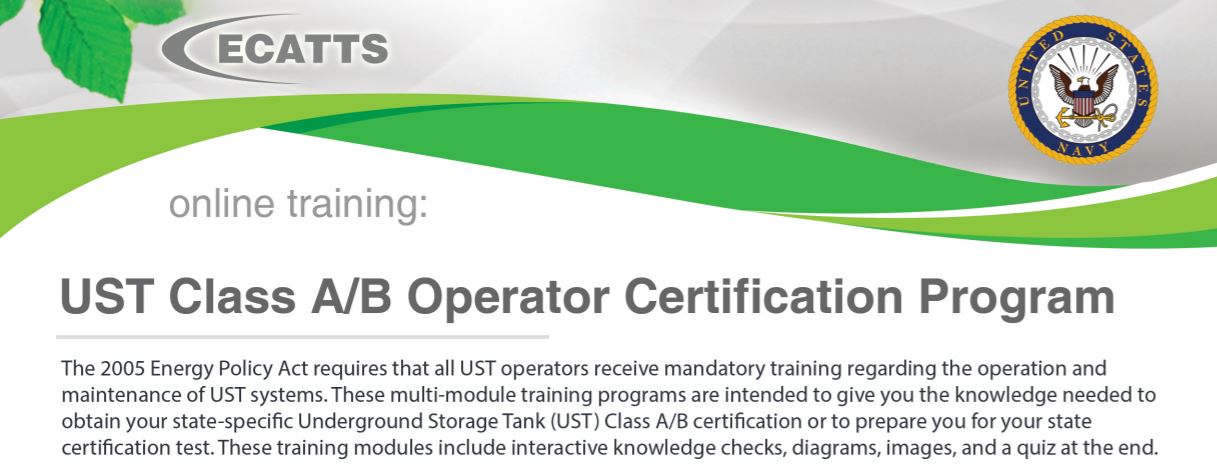Latest Environmental News
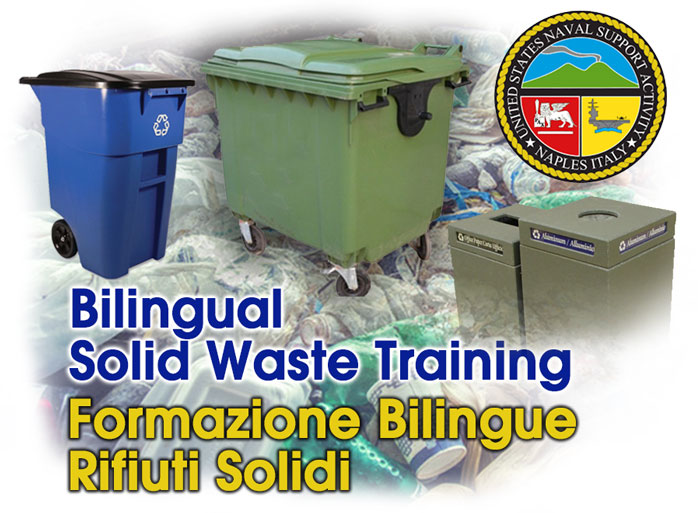 |
Training Added August 2025
To provide an awareness and understanding of the Italy Final Governing Standards (I-FGS) requirements for solid waste storage and disposal.
The Future of Energy. How Natural Resources and Renewables Can Work Together.
The Vital Role of Wetlands. Why Protection and Education Matter.
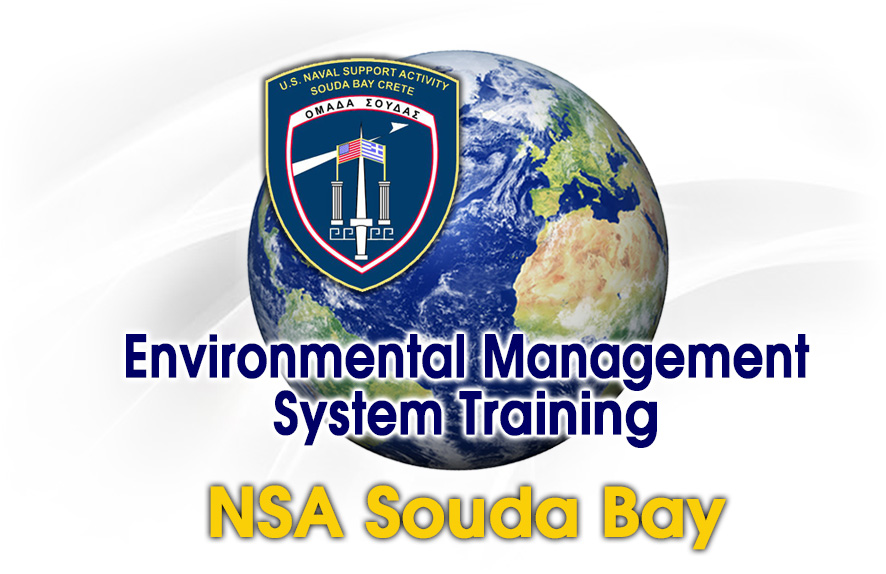 |
Training Updated July 2025
OPNAVINST 5090.1, requires:
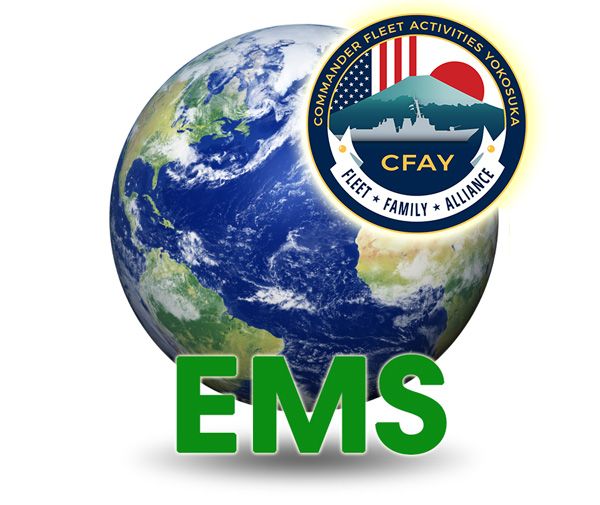 |
Training Updated June 2025
ALL personnel who work on Commander Fleet Activities Yokosuka
OPNAVINST 5090.1, requires:
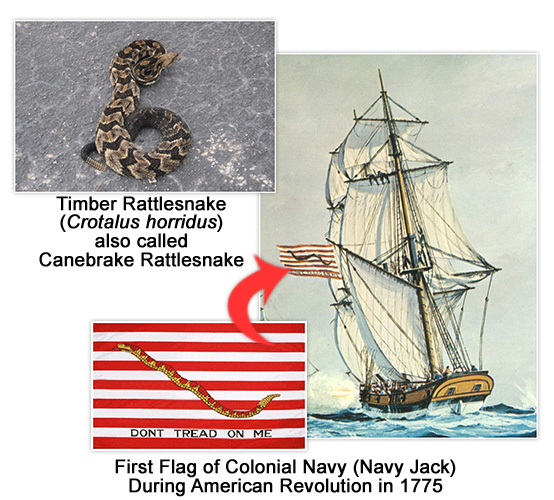 |
Amphibians & Reptiles. Ecosystem Allies
Have you taken your Amphibian and Reptile Training?
An Introduction to Amphibians and Reptiles
Diversity of Amphibians and Reptiles in the United States
General Inventory and Monitoring Techniques for Herpetofauna
Habitat Management Guidelines for Amphibians and Reptiles on DoD Installations
Incorporating Science into Management and Conservation of Herpetofauna
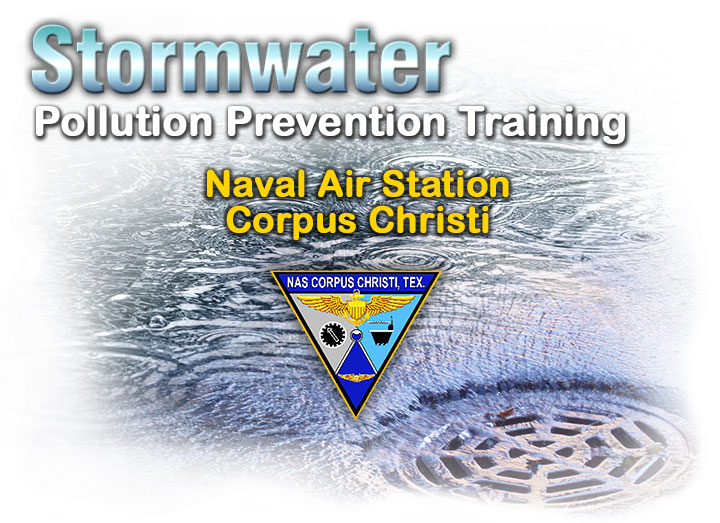 |
Training Updated April 2025
Why are we doing this training?
Compliance with 3 different permits/plans;
- Multi-sector General Permit (MSGP) for Industrial Facilities,
- Municipal Separate Storm Sewer System (MS4) Permit,
- Storm Water Construction General Permit (CGP).
Do you know Best Management Practices (BMPs) to Prevent Pollution?
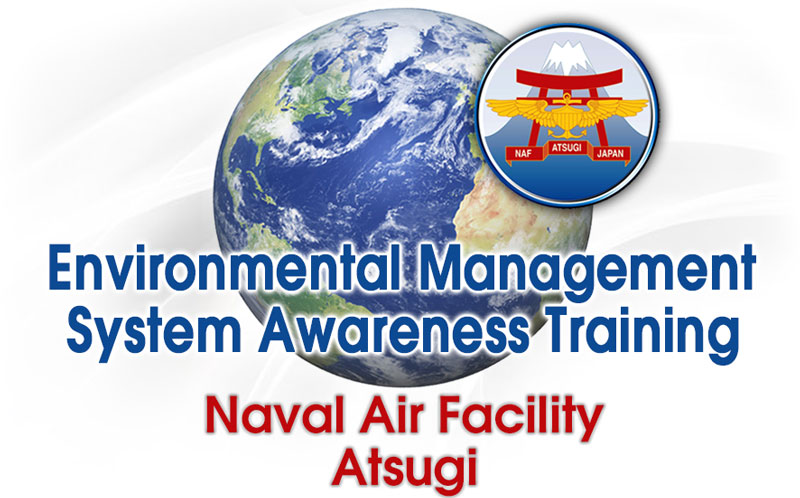 |
Training Updated April 2025
ALL personnel who work on NAF Atsugi
OPNAVINST 5090.1, requires:
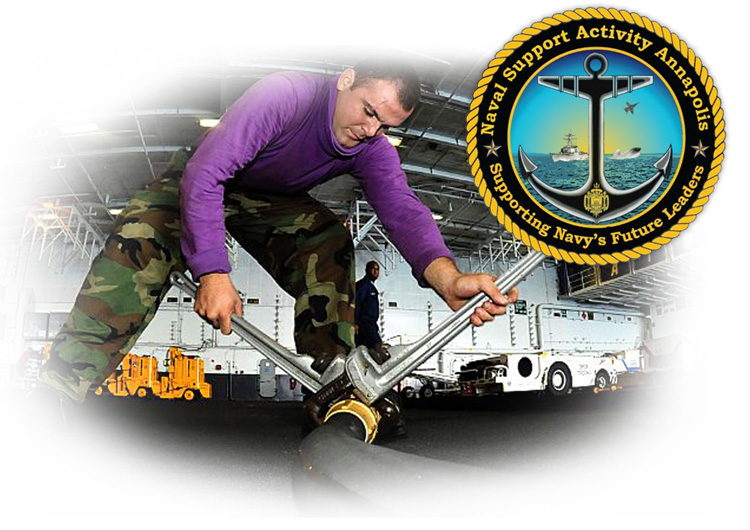 |
All Facility oil handling personnel on Installations.
40 CFR 112.7(f)(1) requires training for oil-handling personnel in the operation and maintenance of equipment to prevent discharges; discharge procedure protocols; applicable pollution control laws, rules, and regulations; general facility operations; and the contents of the facility SPCC Plan.
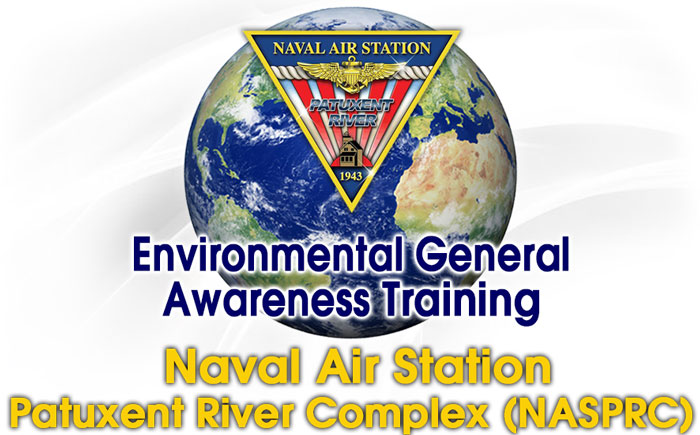 |
Training Updated April 2025
OPNAV 5090.1, Ch. 17, requires:
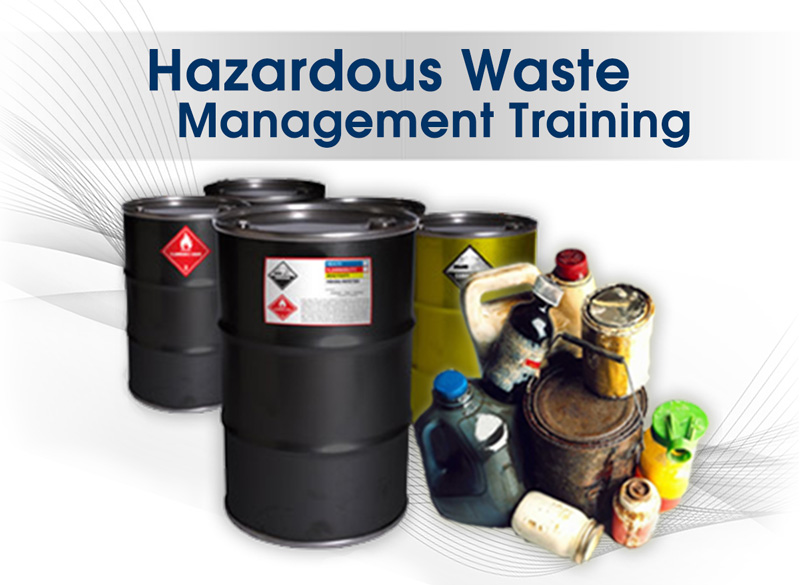 |
Training Created March 2025
Topics include state, local, and federal HW laws & regulations, penalties, identification, stream profiles, storage areas, containers, labeling, turn-in, recordkeeping, training & safety requirements, and contacts.
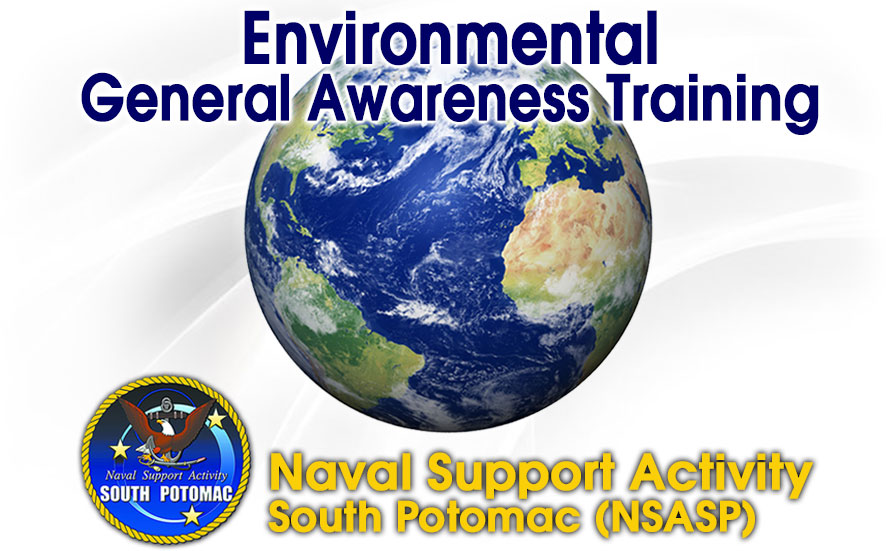 |
Training Updated March 2025
OPNAV 5090.1, Ch. 17, requires:
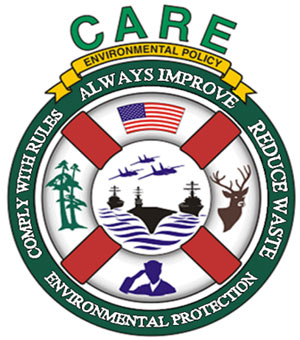 |
It is required!
- Navy Policy (OPNAV-M 5090.1) requires Environmental Awareness training for all Navy military, civilian, and contractor personnel.
- Initial and refresher training is required as soon as practical after reporting to an installation or activity and at least every 3 years.
All Things Pollution. The Hidden Dangers of Noise, Light, Dust, and More!
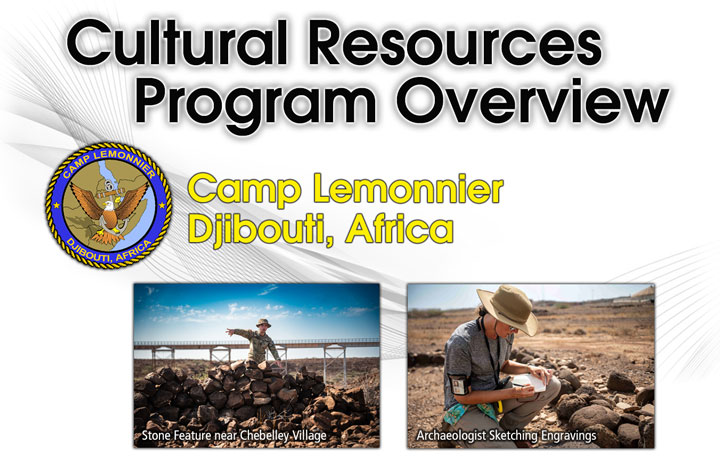 |
Training Added February 2025
- Summarize overseas cultural resources compliance requirements
- Provide an overview of the Cultural Resources Management Program
- Familiarize personnel with the Cultural Resources Management Plan (CRMP)
- Provide an overview of information on local cultural resources
- Provide a summary of general cultural resources management actions to be completed by environmental staff
Have you taken the Cultural Resource Program Overview training for Camp Lemonnier?
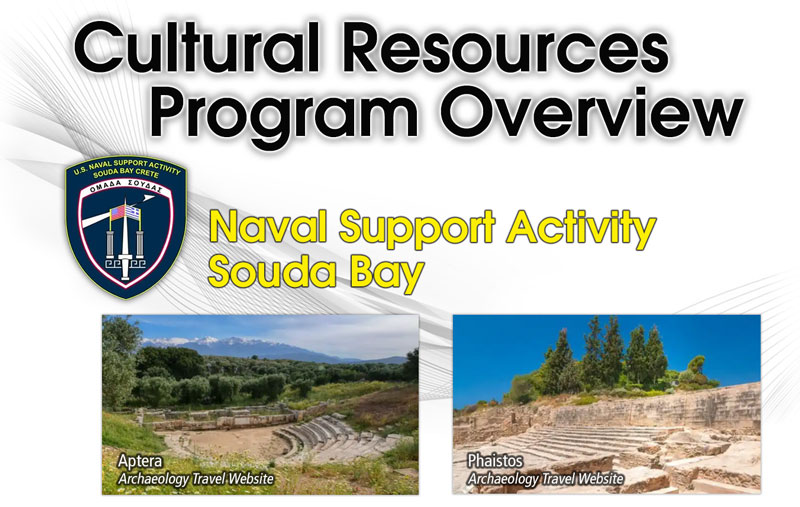 |
Training Added February 2025
- Summarize overseas cultural resources compliance requirements
- Provide an overview of the Cultural Resources Management Program
- Familiarize personnel with the Cultural Resources Management Plan (CRMP)
- Provide an overview of information on local cultural resources
- Provide a summary of general cultural resources management actions to be completed by environmental staff
Have you taken the Cultural Resource Program Overview training for NSA Souda Bay?
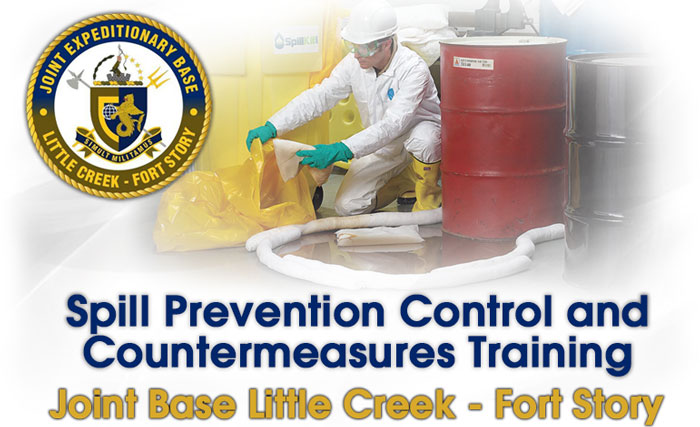 |
Training Updated February 2025
40 CFR Part 112, requires:
Click here to take your Spill Prevention Control and Countermeasures Training for JEB Little Creek.
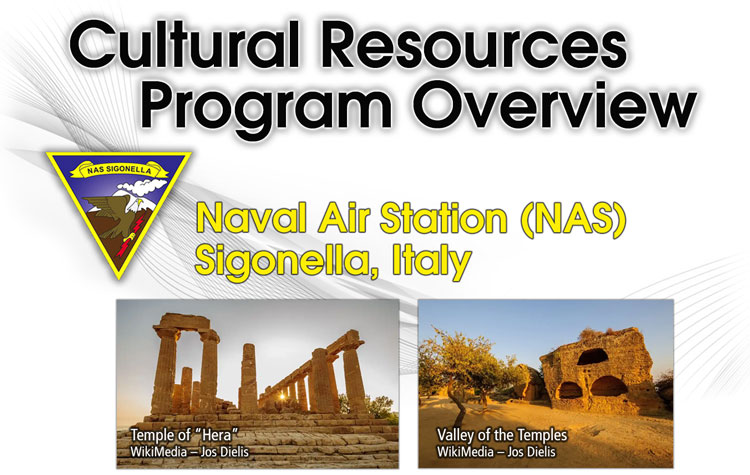 |
Training Added February 2025
- Summarize overseas cultural resources compliance requirements
- Provide an overview of the Cultural Resources Management Program
- Familiarize personnel with the Cultural Resources Management Plan (CRMP)
- Provide an overview of information on local cultural resources
- Provide a summary of general cultural resources management actions to be completed by environmental staff
Have you taken the Cultural Resource Program Overview training for NAS Sigonella?
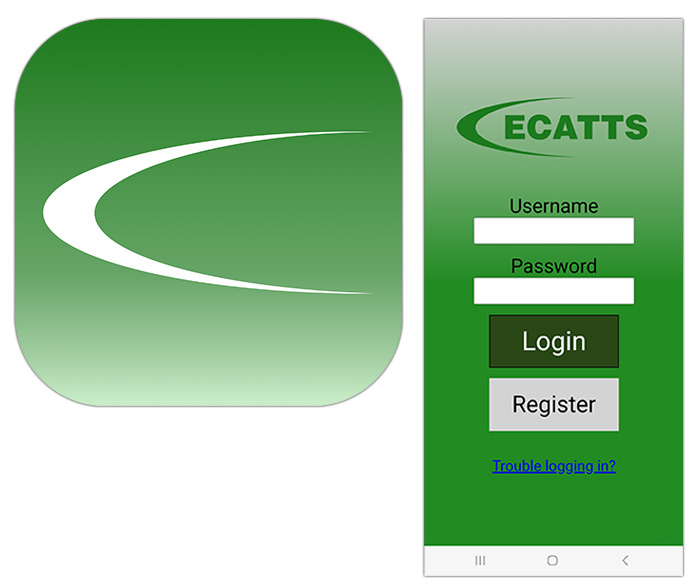 |
You can now access all of your online ECATTS training through our brand new mobile app!
Download the app from your Apple app store or the Google Play store by searching ECATTS.
With this app, you will be able to access your training plan and receive certification, making it even easier to keep up with your training on the go!
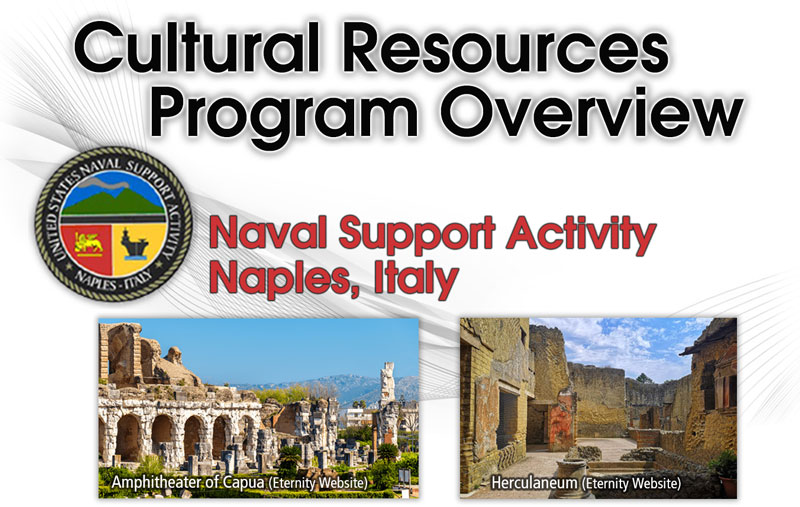 |
Training Added February 2025
- Summarize overseas cultural resources compliance requirements
- Provide an overview of the Cultural Resources Management Program
- Familiarize personnel with the Cultural Resources Management Plan (CRMP)
- Provide an overview of information on local cultural resources
- Provide a summary of general cultural resources management actions to be completed by environmental staff
Have you taken the Cultural Resource Program Overview training for NSA Naples?
The Ultimate Guide to Correct and Effective Recycling
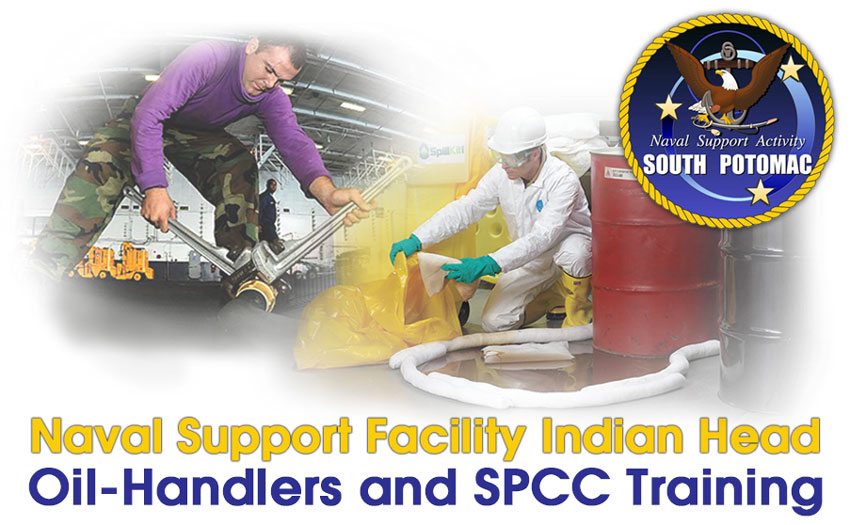 |
Training Updated January 2025
Course Objectives
- Inform oil-handlers what to do when a release occurs as identified in the facility Spill Prevention, Control, and Countermeasures (SPCC) Plan
- Explain applicable Federal and State Compliance standards to oil-handlers and tank inspectors
- Raise awareness about petroleum related spills and develop lessons learned with the goal of preventing future spills
- Review examples of typical releases and typical fuel storage concerns
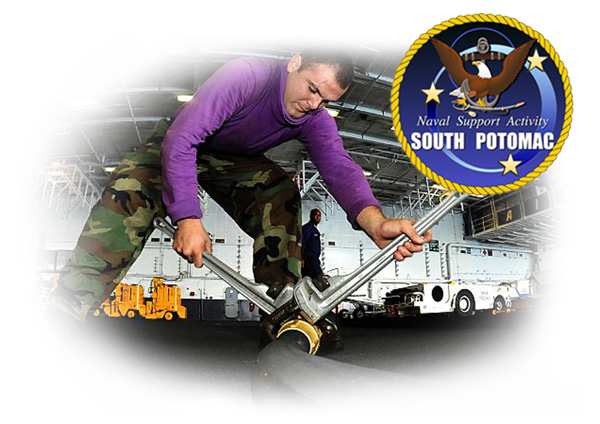 |
All Facility oil handling personnel on Installations.
40 CFR 112.7(f)(1) requires training for oil-handling personnel in the operation and maintenance of equipment to prevent discharges; discharge procedure protocols; applicable pollution control laws, rules, and regulations; general facility operations; and the contents of the facility SPCC Plan.
Training was updated for Executive Order 14148. EO 14148 revoked EO 13990.
EO 14148, Initial Rescissions of Harmful Executive Orders and Actions
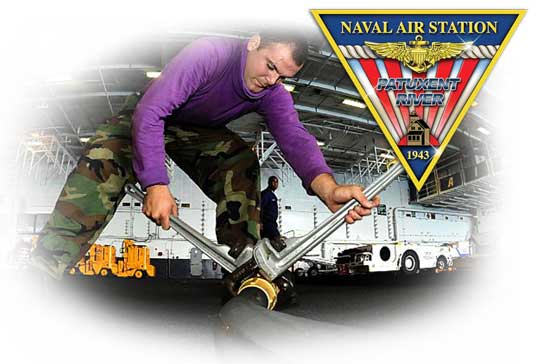 |
All Facility oil handling personnel on Installations.
40 CFR 112.7(f)(1) requires training for oil-handling personnel in the operation and maintenance of equipment to prevent discharges; discharge procedure protocols; applicable pollution control laws, rules, and regulations; general facility operations; and the contents of the facility SPCC Plan.
Eco Friendly Holidays: A Sustainable Celebration
Understanding Landfills: How They Really Work
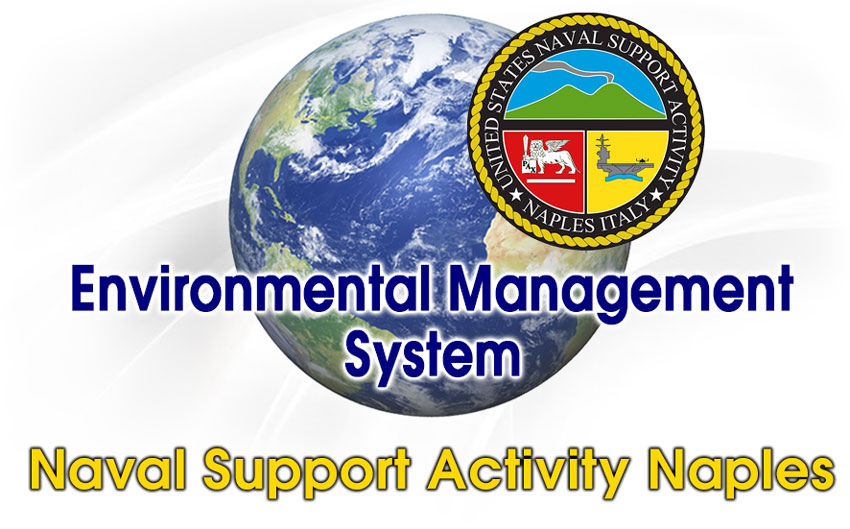 |
Training Updated November 2024
ALL personnel who work on Naval Support Activity Naples.
OPNAVINST 5090.1, requires:
Have you taken your EMS training for Naval Support Station Naples?
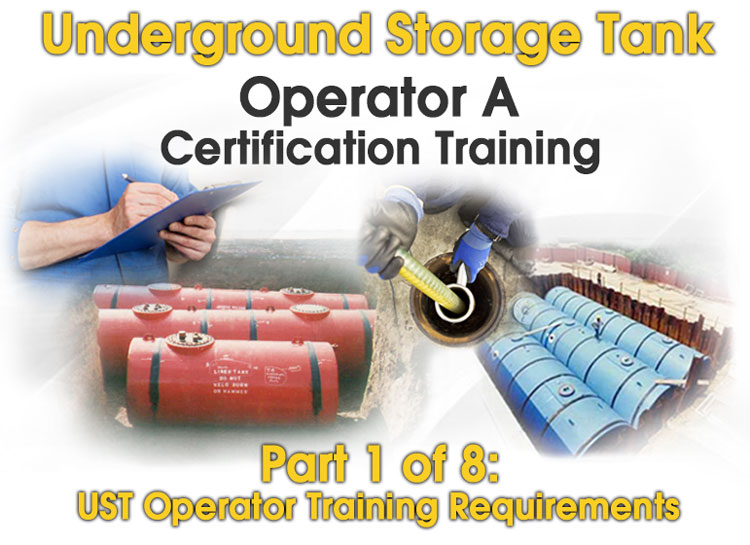 |
Training Added October 2024
- All NAVSTA Rota personnel who operate, maintain, inspect, audit, and refuel USTs.
- The OEBGD requires training regarding the operation and maintenance of UST systems.
- Knowledge needed to obtain your base-specific UST Class A/B certification and how to properly identify, operate, and maintain USTs.
| Part 1 | Part 2 | Part 3 | Part 4 | Part 5 | Part 6 | Part 7 | Part 8 |
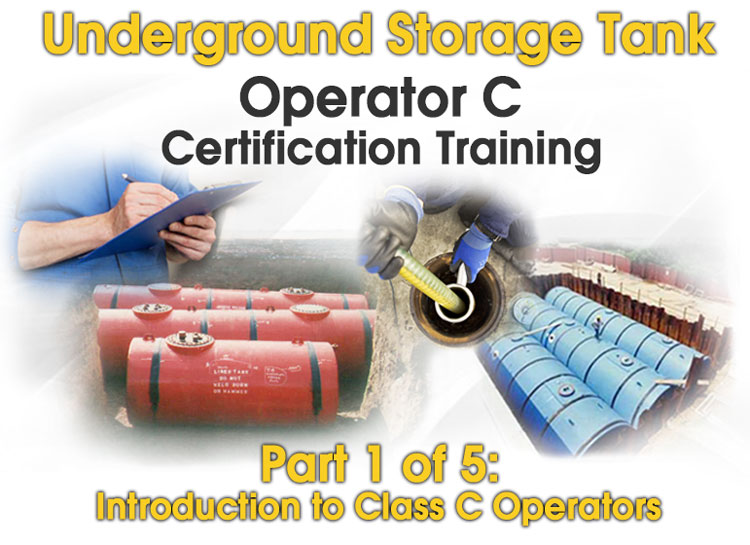 |
Training Added October 2024
- All NAVSTA Rota personnel who will be responsible for addressing emergencies presented by a spill or release from a UST system.
- The OEBGD requires training regarding the operation and maintenance of UST systems.
- Knowledge needed to obtain your base-specific UST Class C certification and how to properly identify problems or emergency situations at your facility and how to respond to them.
| Part 1 | Part 2 | Part 3 | Part 4 | Part 5 |
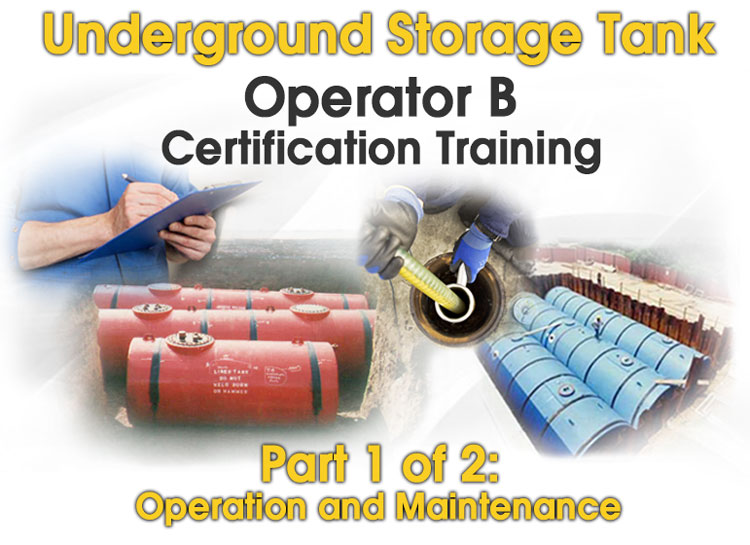 |
Training Added October 2024
- NAVSTA Rota personnel who have taken and passed the UST Class A operator course with certification.
- The OEBGD requires training regarding the operation and maintenance of UST systems.
- Knowledge needed to obtain your base-specific UST Class B certification, how to properly operate and maintain USTs, and how to complete OEBGD reporting requirements.
| Part 1 | Part 2 |
Conservation 101 - Key Principles, Practices, and the Role of Environmental Compliance
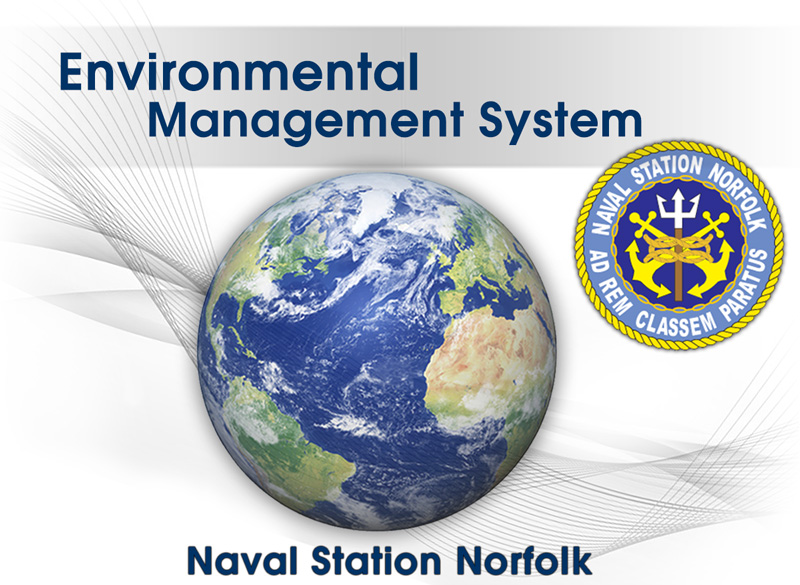 |
Training Updated September 2024
ALL personnel who work on Naval Station Norfolk
OPNAVINST 5090.1, requires:
Water, the Most Abundant Molecule on Earth
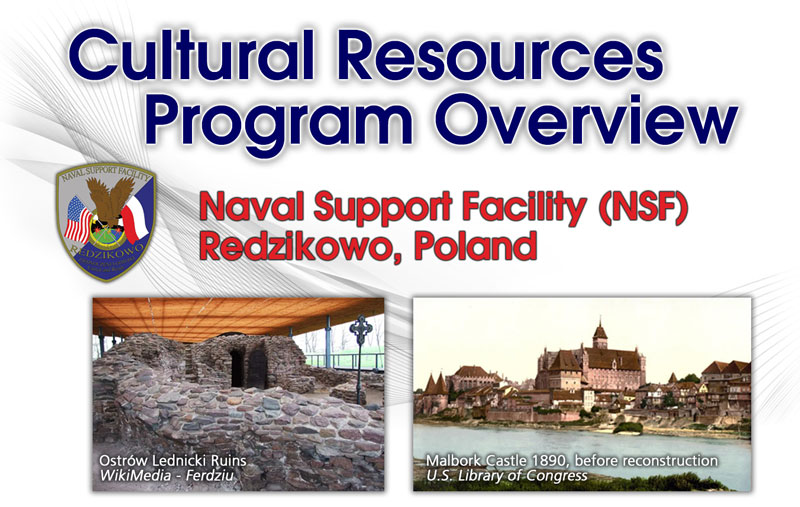 |
Training Added September 2024
- Summarize overseas cultural resources compliance requirements
- Provide an overview of the Cultural Resources Management Program
- Familiarize personnel with the Cultural Resources Management Plan (CRMP)
- Provide an overview of information on local cultural resources
- Provide a summary of general cultural resources management actions to be completed by environmental staff
Have you taken the Cultural Resource Program Overview training for NSF Redzikowo?
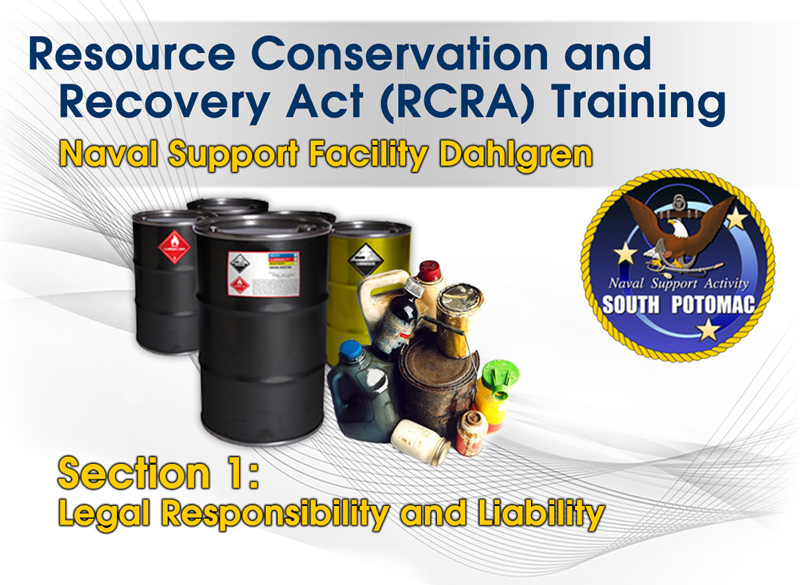 |
Training Added February 2024
Topics Include:
- Legal Responsibility and Liability
- Hazardous and Non-Hazardous Waste Definitions
- Acceptable Storage Locations for Hazardous Waste
- Storage Site Requirements
- Disposal Procedures
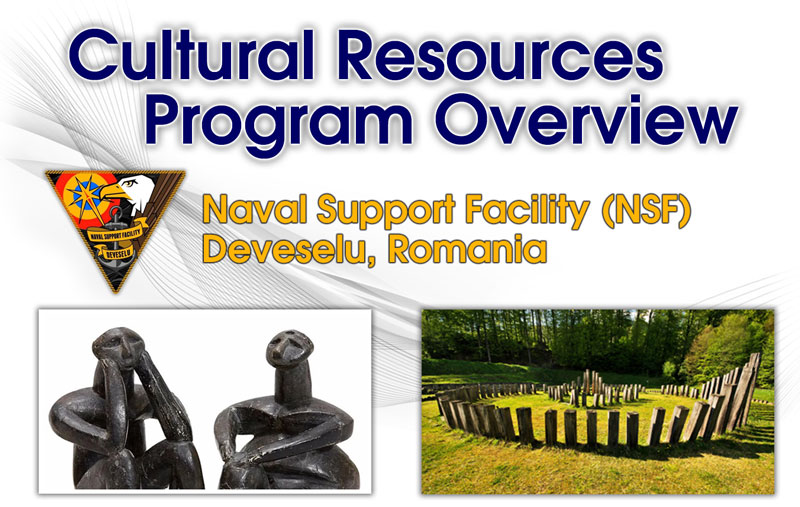 |
Training Added July 2024
- Summarize overseas cultural resources compliance requirements
- Provide an overview of the Cultural Resources Management Program
- Familiarize personnel with the Cultural Resources Management Plan (CRMP)
- Provide an overview of information on local cultural resources
- Provide a summary of general cultural resources management actions to be completed by environmental staff
Have you taken the Cultural Resource Program Overview training for NSF Deveselu?
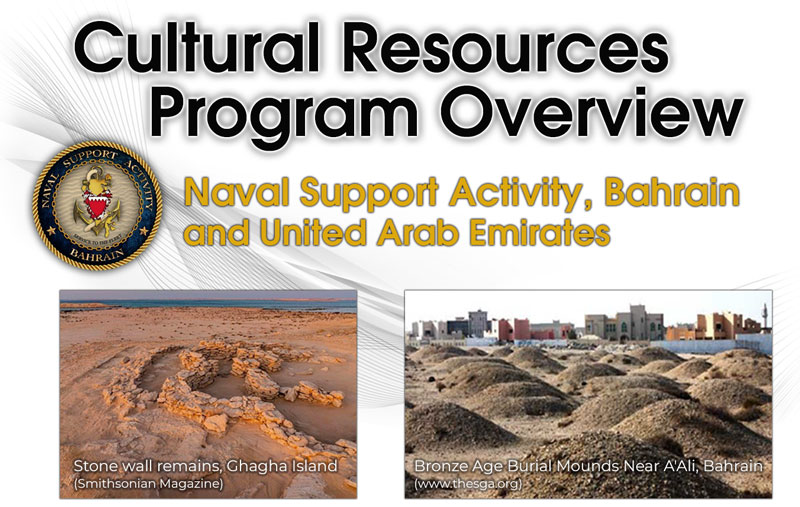 |
Training Added June 2024
- Summarize overseas cultural resources compliance requirements
- Provide an overview of the Cultural Resources Management Program
- Familiarize personnel with the Cultural Resources Management Plan (CRMP)
- Provide an overview of information on local cultural resources
- Provide a summary of general cultural resources management actions to be completed by environmental staff
Have you taken the Cultural Resource Program Overview training for NSA Bahrain and UAE?
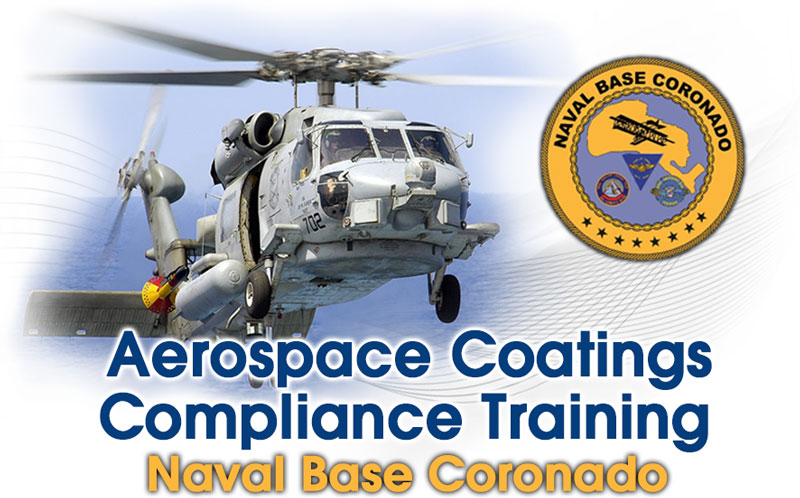 |
Training Added June 2024
- Air Permit Examples
- Record keeping
- Electronic Coating Log
- What not to HVLP Spray
- Notice of Violations (NOV)
- HVLP Gauge, Cleaning, and Fogging
- Open Containers
- Lockers
- Contacts
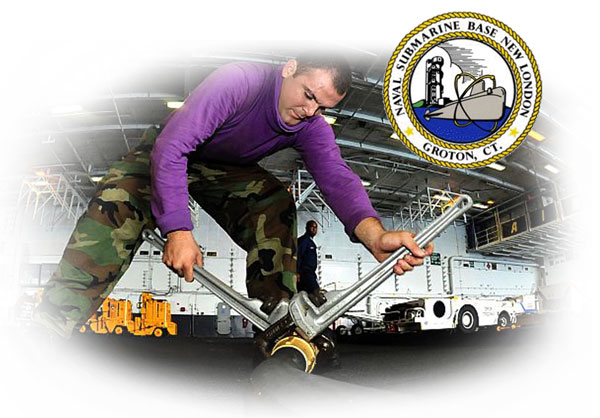 |
Training Updated June 2024
Training Goals
- Familiarize employees with the written SPCC Plan
- Identify oil storage locations and loading procedures checkmark
- Instruct appropriate SPCC coordinators in CTDEEP required inventory control
- Identify spill pathways
- Discuss spill prevention procedures
- Familiarize employees with appropriate spill response procedures and use of response equipment
- Discussion to figure out any new chemicals, processes, or tanks that require new or modified procedures
- Discussion of any new spills or releases along with any associated response activities during the previous year
 |
All Facility oil handling personnel on Installations.
40 CFR 112.7(f)(1) requires training for oil-handling personnel in the operation and maintenance of equipment to prevent discharges; discharge procedure protocols; applicable pollution control laws, rules, and regulations; general facility operations; and the contents of the facility SPCC Plan.
 |
Have you seen this yet?
ECATTS now provides the ability for you to print your training and save it as a valuable reference.
Simply click on the blue PRINT THIS TRAINING icon located at the beginning of the training.
| 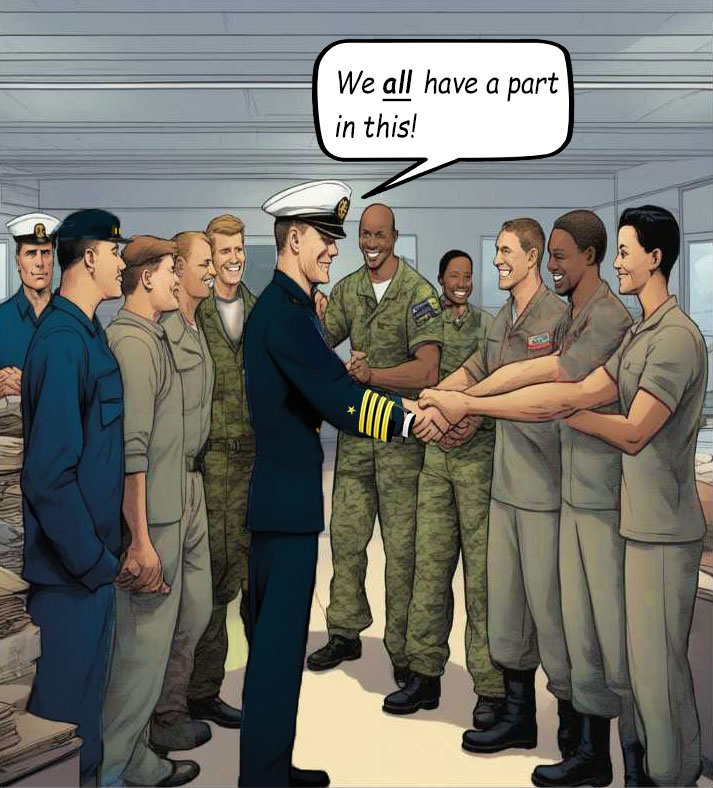 |
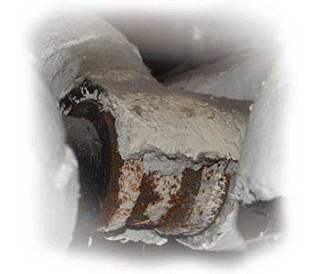 |
These features include dynamic content presentations, more interactive elements, knowledge checks with real-time feedback, hyperlinks to other sources for more information, hover-overs for acronym definitions, hover-overs for additional information, dynamic photos and images, and audio.
We would love your input and feedback on these elements! This can be done by clicking on SUGGESTIONS in the above green bar or submitting to support@ecatts.com.
Would you like more within the training? Do you prefer certain elements over other elements?
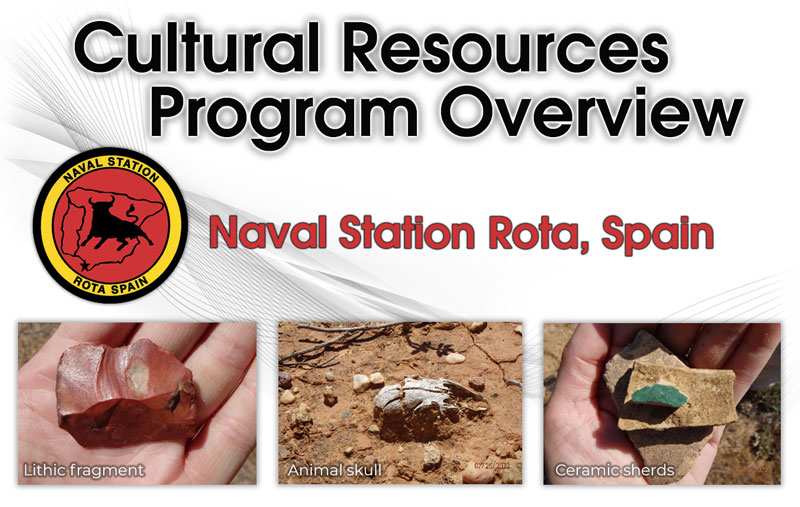 |
Training Added May 2024
- Summarize overseas cultural resources compliance requirements arrow
- Provide an overview of the Cultural Resources Management Program arrow
- Familiarize personnel with the Cultural Resources Management Plan (CRMP) arrow
- Provide an overview of information on local cultural resources arrow
- Provide a summary of general cultural resources management actions to be completed by environmental staff
Have you taken the Cultural Resource Program Overview training for Naval Station Rota?
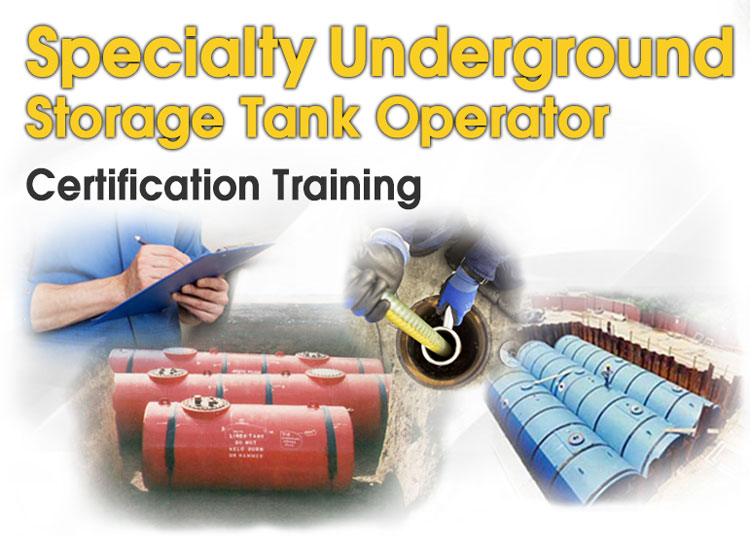 |
Training Added April 2024
- All NSA Souda Bay personnel who design, operate, maintain, inspect, and audit specialty USTs..
- The OEBGD requires training regarding the operation and maintenance of UST systems.
- Knowledge needed to obtain your base-specific Specialty Underground Storage Tank (UST) certification and how to properly identify, operate, and maintain Specialty UST systems.
| Part 1 |
 |
Training Added April 2024
- All NSA Souda Bay personnel who will be responsible for addressing emergencies presented by a spill or release from a UST system.
- The OEBGD requires training regarding the operation and maintenance of UST systems.
- Knowledge needed to obtain your base-specific UST Class C certification and how to properly identify problems or emergency situations at your facility and how to respond to them.
| Part 1 | Part 2 | Part 3 | Part 4 | Part 5 |
 |
Training Added April 2024
- NSA Souda Bay personnel who have taken and passed the UST Class A operator course with certification.
- The OEBGD requires training regarding the operation and maintenance of UST systems.
- Knowledge needed to obtain your base-specific UST Class B certification, how to properly operate and maintain USTs, and how to complete OEBGD reporting requirements.
| Part 1 | Part 2 |
 |
Training Added April 2024
- All NSA Souda Bay personnel who operate, maintain, inspect, audit, and refuel USTs.
- The OEBGD requires training regarding the operation and maintenance of UST systems.
- Knowledge needed to obtain your base-specific UST Class A/B certification and how to properly identify, operate, and maintain USTs.
| Part 1 | Part 2 | Part 3 | Part 4 | Part 5 | Part 6 | Part 7 | Part 8 |
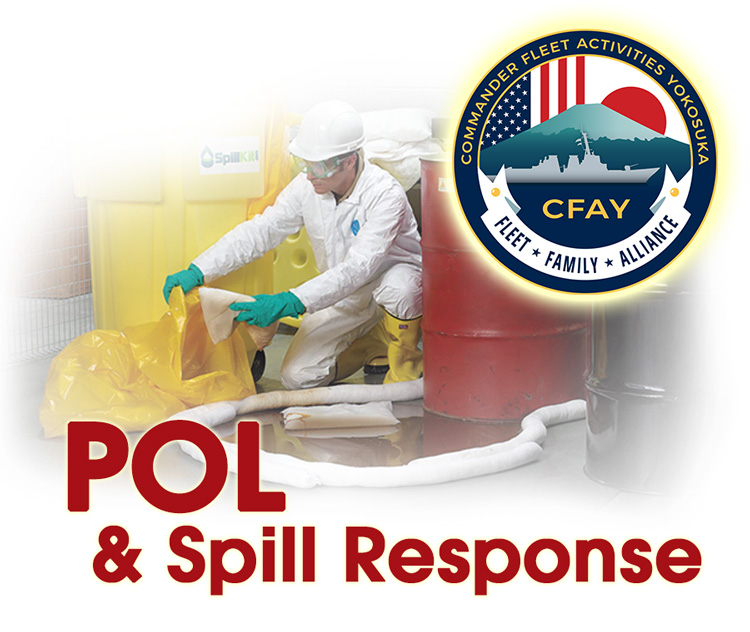 |
Training Added April 2024
ALL personnel handling POL.
JEGS requires:
-
At a minimum, all personnel handling POL must be trained annually on:
- 11.3.1 General facility operations.
- 11.3.2 Operation and maintenance of equipment to prevent accidental discharges.
- 11.3.3 Spill response procedures.
- 11.3.4 Contents of the Spill Prevention and Response Plan.
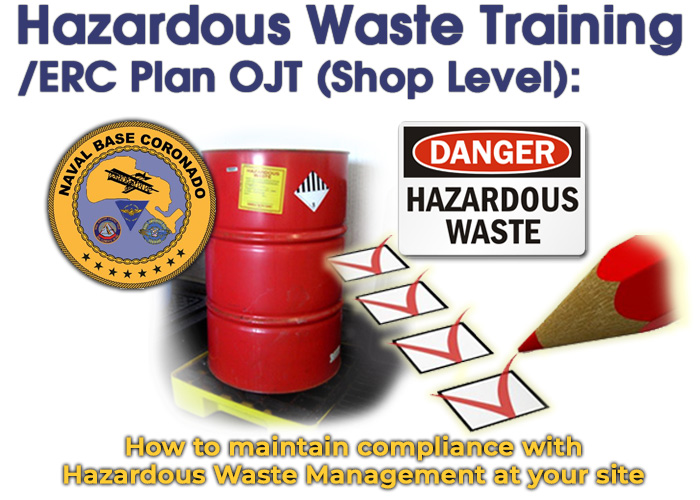 |
Training Added April 2024
- Regulations
- Record keeping
- Hazardous Waste Identification
- Containers, labels, and storage
- Compatibility Chart
- Spill Response
- Medical Waste policies, labeling, sharps, expired, and collection
- Emergency Response and Contingency Plans
- Hazardous Waste Pickup forms, inspections, and checklist
 |
Training Updated March 2024
ALL personnel who work on Commander Fleet Activities Yokosuka
OPNAVINST 5090.1, requires:
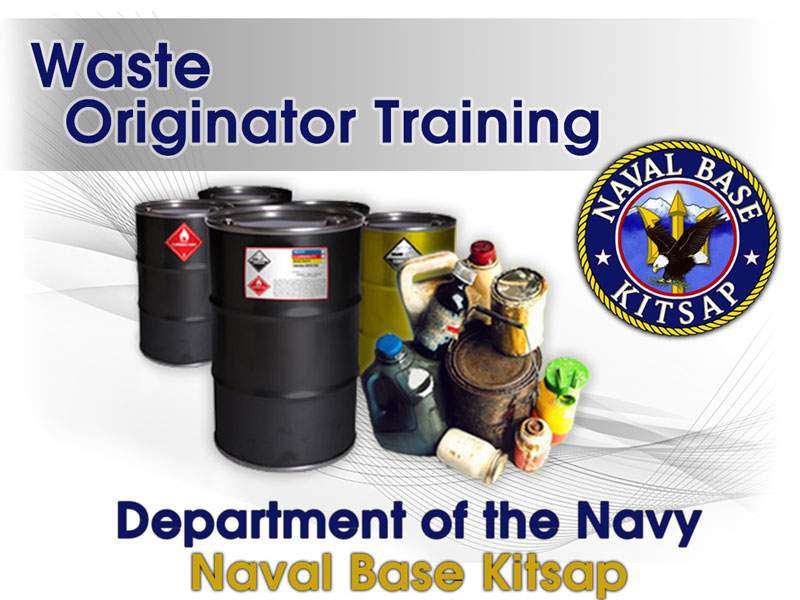 |
Training Updated March 2024
Why are we doing this training
- To provide training for Waste Originators to handle and properly dispose of regulated waste at NBK Bangor, NH Bremerton, and Jackson Park
Who is required to complete this training?
- All military, civilian, and contractor employees producing waste on NBK. (Unless they are assigned to work with a qualified waste originator).
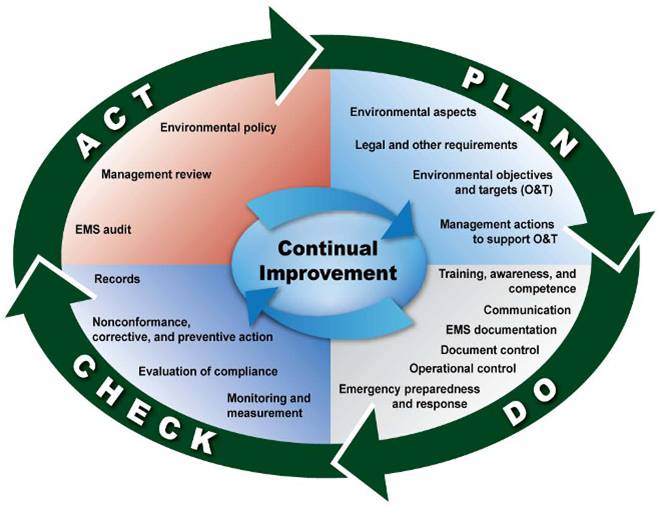 |
Training Updated March 2024
ALL personnel who work on NAF Atsugi
OPNAVINST 5090.1, requires:
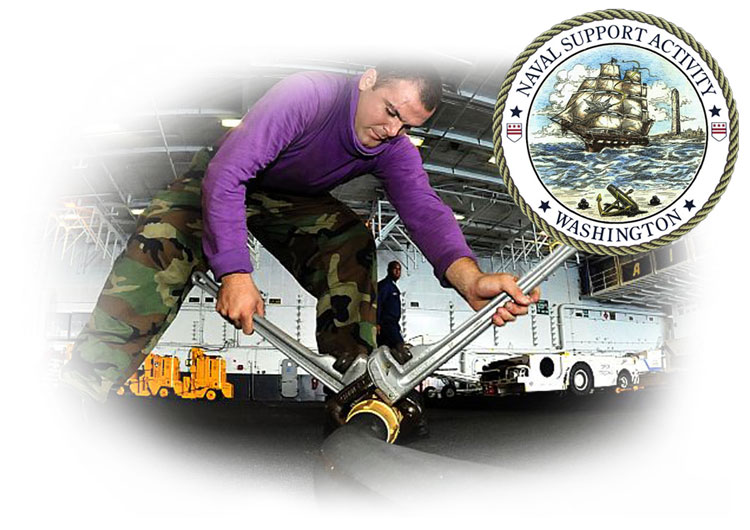 |
Training Updated March 2024
Why are we doing this training
- To meet the 40 CFR 112.7(f) training requirement.
Who is required to complete this training?
- All Facility Oil Handling Personnel are required to complete this training annually.
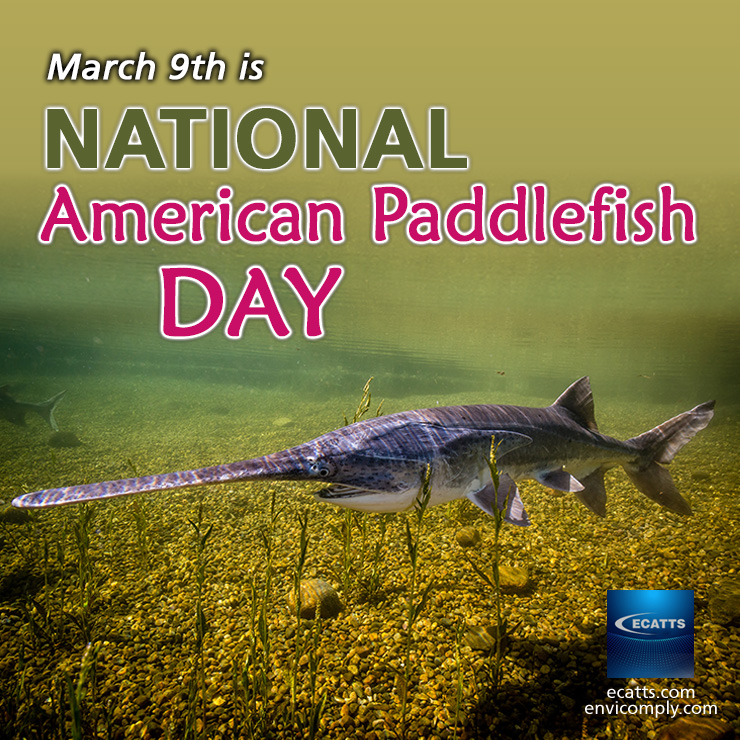 |
Follow our Instagram Account (ecattstraining) for a light, casual, daily dose of nature, the environment, and environmental awareness.
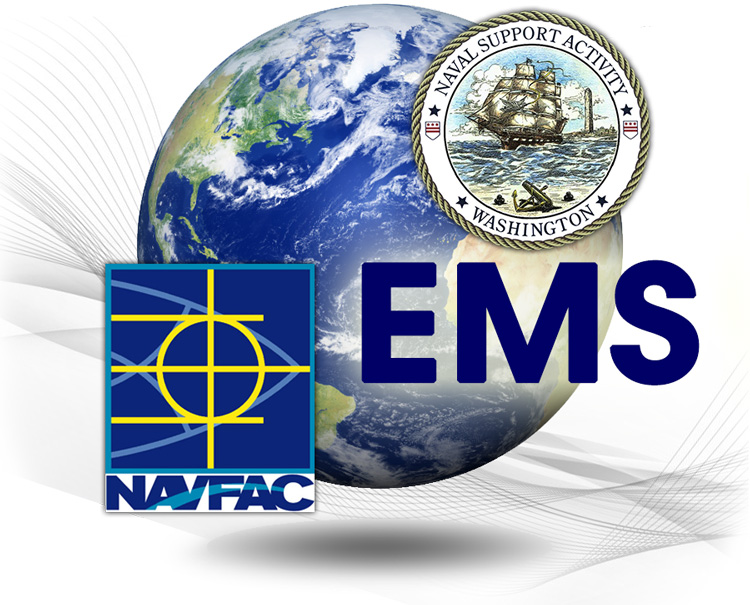 |
Training Updated March 2024
ALL personnel who work on NAS Washington
OPNAVINST 5090.1, requires:
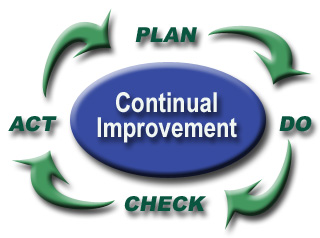 |
Training Updated February 2024
ALL personnel who work on Naval Computer and Telecommunications Area Master Station Atlantic, Detachment Cutler
OPNAVINST 5090.1, requires:
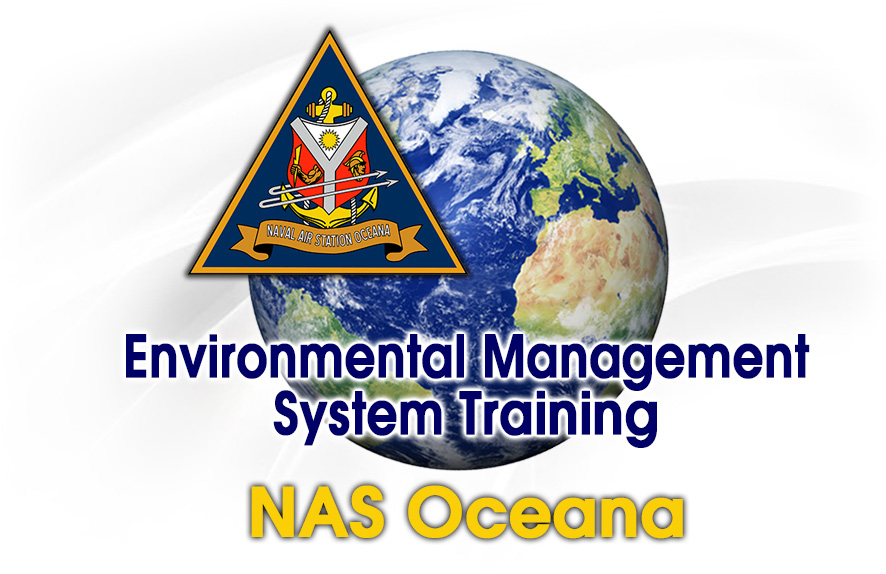 |
Training Updated February 2024
OPNAVINST 5090.1, requires:
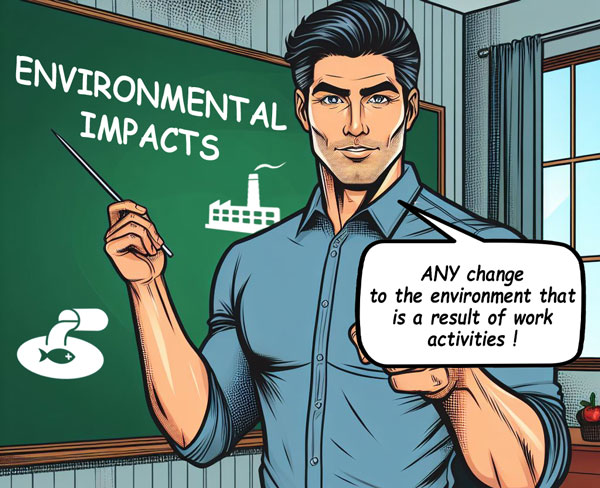 |
Training Updated January 2024
ALL personnel who work on Naval Submarine Base New London
OPNAVINST 5090.1, requires:
 |
Training Updated for 2024
Course Objectives
- Meet the 40 CFR 112.7(f)(1) training requirements
- Inform oil-handlers what to do when a release occurs as identified in the facility Spill Prevention, Control, and Countermeasures (SPCC) Plan
- Explain applicable Federal and State Compliance standards to oil-handlers and tank inspectors
- Raise awareness about petroleum related spills and develop lessons learned with the goal of preventing future spills
- Review examples of typical releases and typical fuel storage concerns
Click here to view the new style.- We would love your input and feedback on this new style!
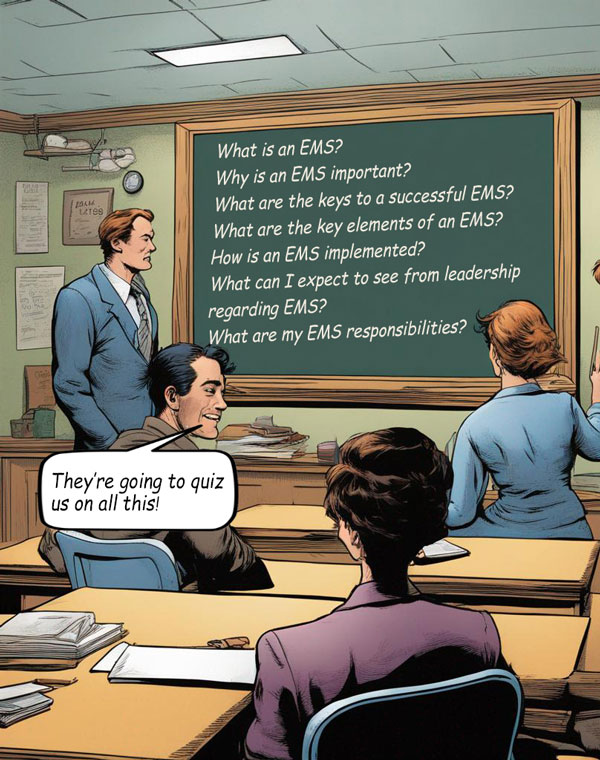 |  |
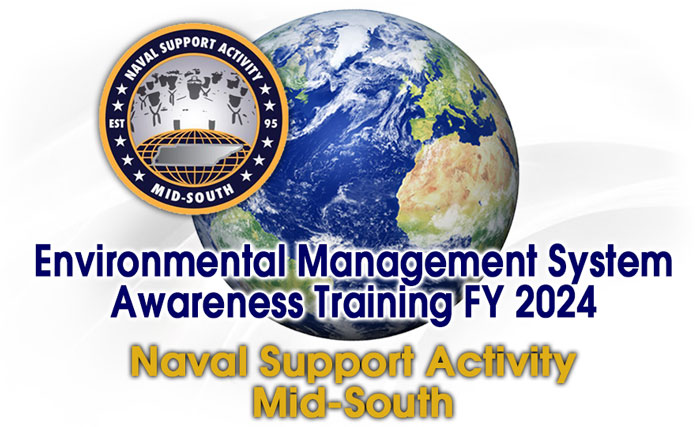 |
Training Updated December 2023
ALL personnel who work on NSA Mid-South
OPNAVINST 5090.1, requires:
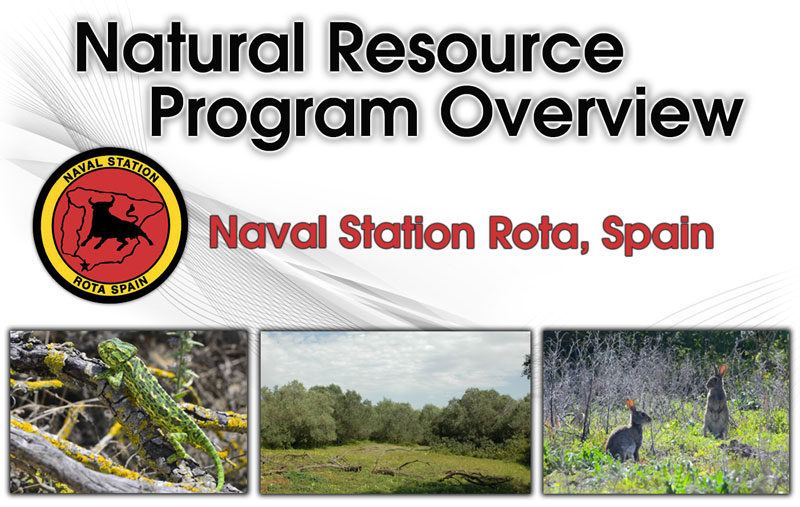 |
Training Added October 2023
- Summarize overseas natural resource compliance requirements
- Provide an overview of the Natural Resource Management Program
- Familiarize personnel with the Natural Resource Management Plan (NRMP)
- Provide general information on local natural resources and protected species
- Identify general natural resource management actions to be completed by environmental staff
Click here to take the Natural Resource Program Overview: Naval Station Rota
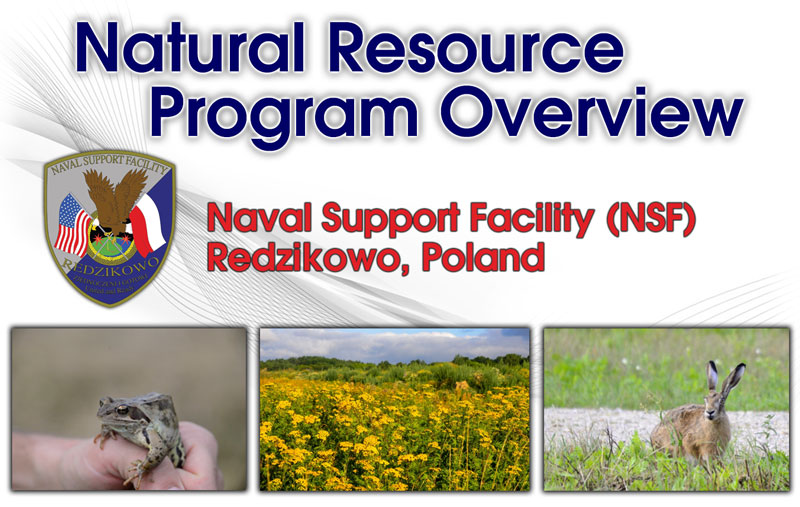 |
Training Added October 2023
- Summarize overseas natural resource compliance requirements
- Provide an overview of the Natural Resource Management Program
- Familiarize personnel with the Natural Resource Management Plan (NRMP)
- Provide general information on local natural resources and protected species
- Identify general natural resource management actions to be completed by environmental staff
Click here to take the Natural Resource Program Overview: NSF Redzikowo
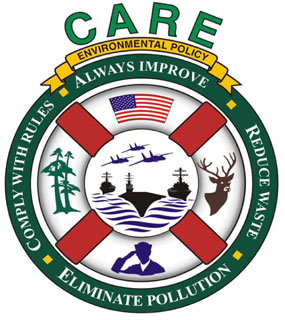 |
Training Updated September 2023
To comply with Executive Orders and U.S. Navy Instruction for Environmental Management Systems (EMS).
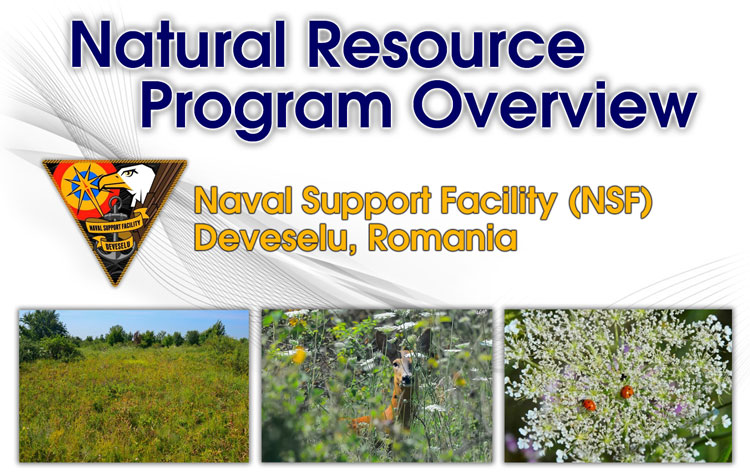 |
Training Added July 2023
- Summarize overseas natural resource compliance requirements
- Provide an overview of the Natural Resource Management Program
- Familiarize personnel with the Natural Resource Management Plan (NRMP)
- Provide general information on local natural resources and protected species
- Identify general natural resource management actions to be completed by environmental staff
Click here to take the Natural Resource Program Overview: NSF Deveselu
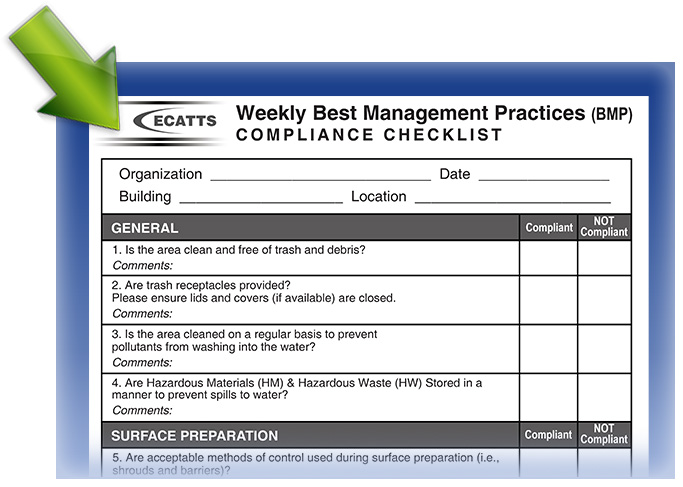 |
Compliance Checklist Training Series
- Target audience is tenants, shop personnel, area personnel, building personnel. Compliance Checklists are included in training and can be used as a reference tool to help areas be in & stay in environmental compliance. This training presents items to review for environmental compliance and explains items on the checklists with examples, pictures, and quick knowledge checks.
Click below to view or take this training.
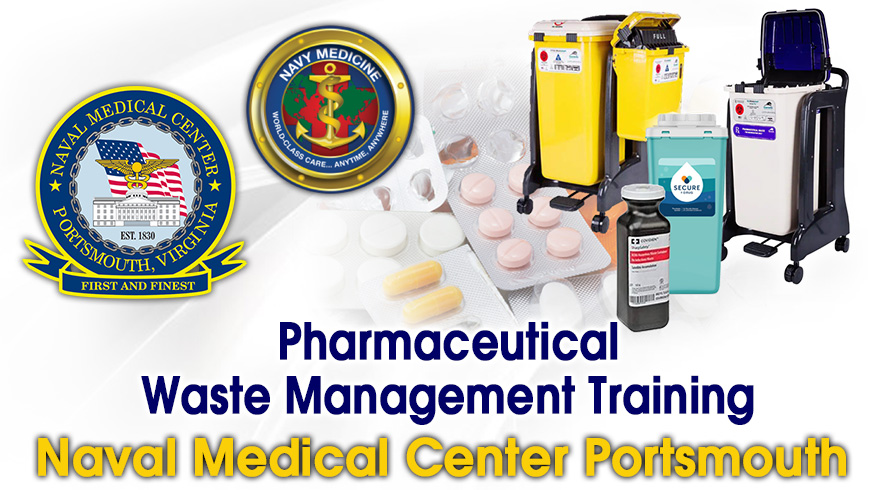 |
Training Updated June 2023
Topics Covered Include:
- Regulations and Policy
- What is Pharmaceutical Waste
- Exclusions
- Types of Pharmaceutical Waste
- Pharmaceutical Waste Classifications
- Management Standards
- Vaccines, IV Bags, Robotics, Spills
Click here to take the Pharmaceutical Waste Management training for Naval Medical Center Portsmouth.
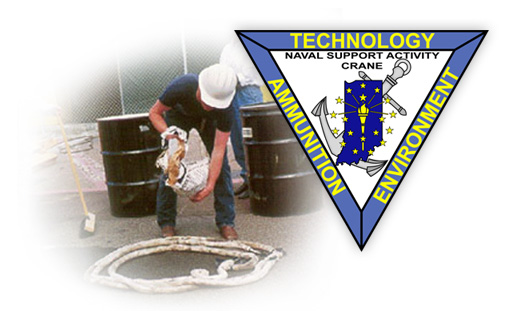 |
Training Updated June 2023
Topics Covered Include:
- The Spill Prevention, Control, and Countermeasure (SPCC) Program
- Storage Tank Management
- Who Must Be Informed About the SPCC Plan
- Types of Oils Are Covered by the SPCC Program
- Spill Prevention and Planning Requirements
- Ways to Prevent or Minimize Potential for Spills
- Recent Spills at NSA Crane
Click here to take the Spill Prevention Control and Countermeasures training for NSA Crane.
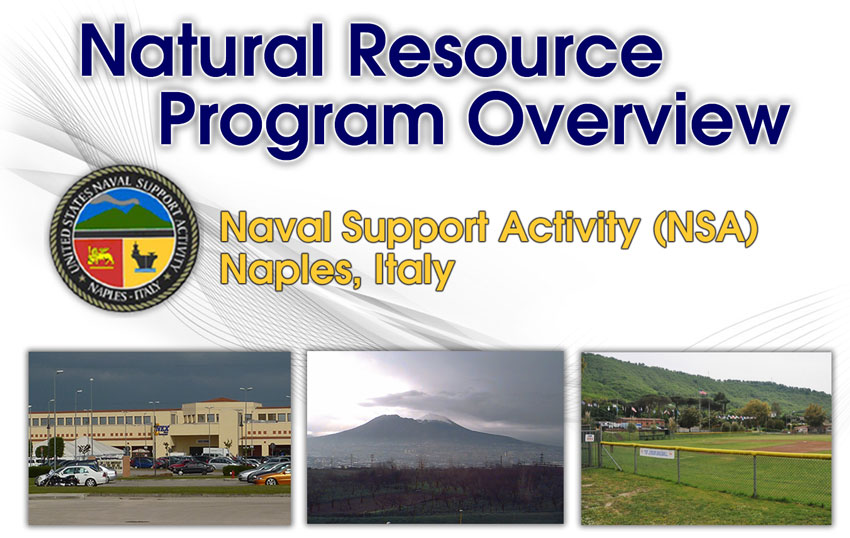 |
Training Added May 2023
- Summarize overseas natural resource compliance requirements
- Provide an overview of the Natural Resource Management Program
- Familiarize personnel with the Natural Resource Management Plan (NRMP)
- Provide general information on local natural resources and protected species
- Identify general natural resource management actions to be completed by environmental staff
Click here to take the Natural Resource Program Overview: NSA Naples
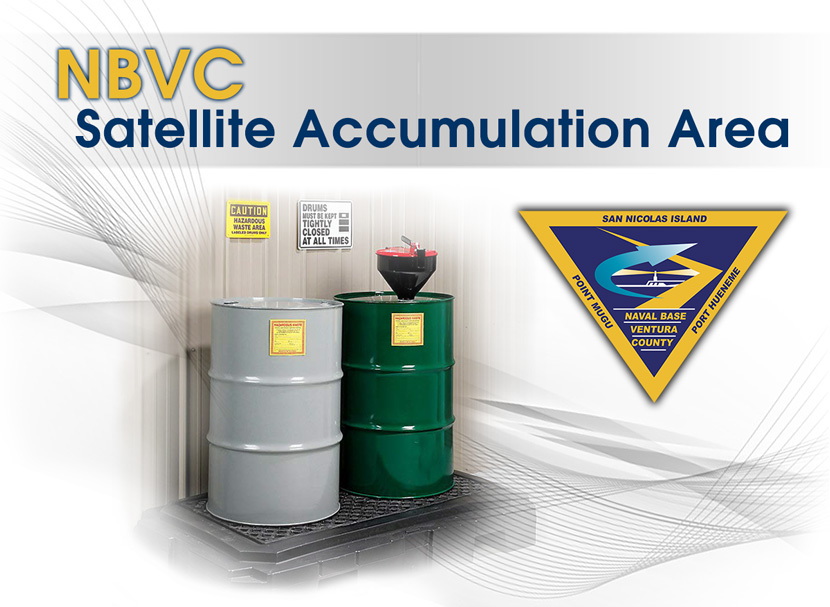 |
Training Added April 2023
- Hazardous Waste Training References
- HW Satellite Accumulation Areas (SAAs)
- Central/General HW Accumulation
- HW Satellite Accumulation Points (SAPs)
- Marking of HW Satellite Accumulation Points (SAPs)
- HW SAP Marking Image
- Definitions
- Identification of Hazardous Wastes
- Management of Universal Wastes
- Management of Empty Containers
- Supporting Laws and Regulations
- Satellite Accumulation Key Points
Click here to take the NBVC Satellite Accumulation Area Training.
 |
Training Updated April 2023
OPNAV 5090.1, Ch. 17, requires:
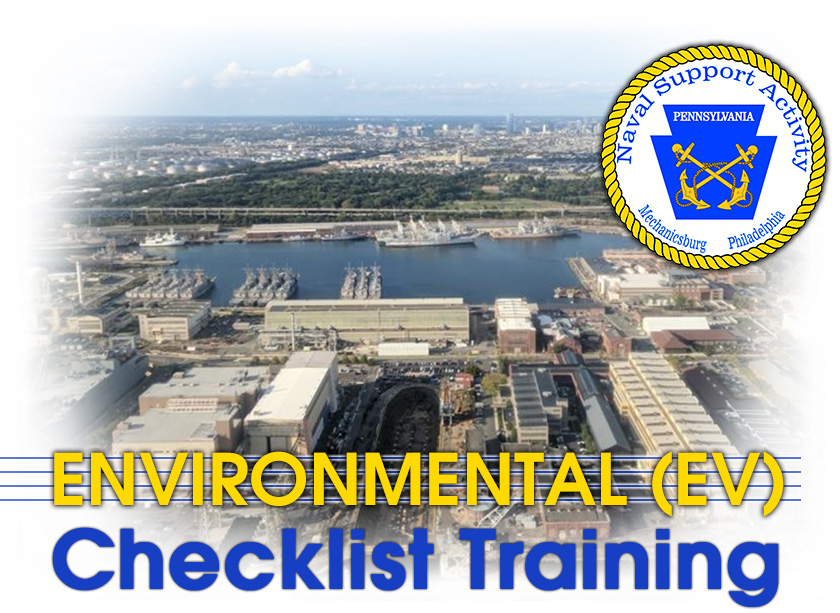 |
Training Created February 2023
The objective of this training is to prevent delays to project schedules.
Click here to review the Environmental (EV) Checklist Training.
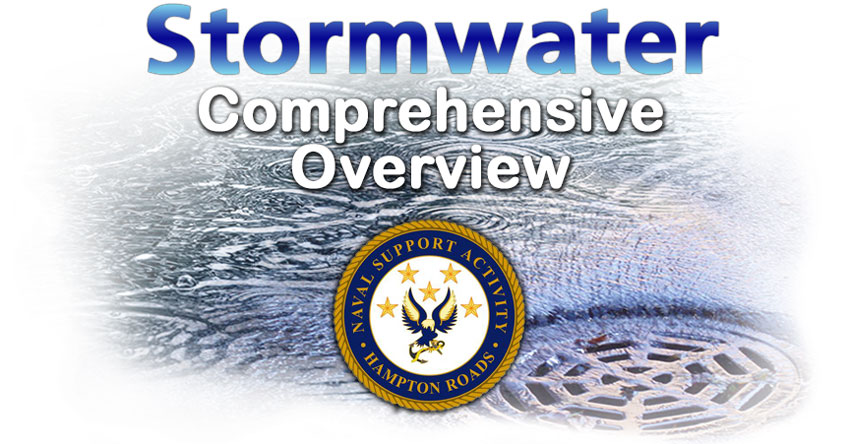 |
Training Created April 2023
This training is a detailed overview of stormwater management information that is intended to help you understand:
- What is stormwater runoff
- Where it comes from
- Why it needs to be managed
- How it can be kept clean
- Where you can find additional information if you have further questions
Click here to take the Stormwater Comprehensive Overview Training for NSA Hampton Roads
 |
Compliance Checklist Training Series
- Target audience is tenants, shop personnel, area personnel, building personnel. Compliance Checklists will be included in training and can be used as a reference tool to help areas be in & stay in environmental compliance. Training will expand and further explain items on the checklists with examples, pictures, and quick knowledge checks.
- Some topics will include Weekly BMPs, SWPPP, P2, Universal Waste Accumulation Areas, Oil Water Separators, Silver Recovery, and Portable Tanks.
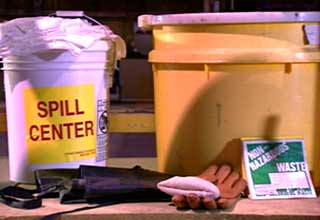 |
Training Updated April 2023
Anyone who is involved in oil handling, transfer, storage, spill response, or maintaining oil filled equipment is expected to be familiar with NSA Hampton Roads Installations's Spill Prevention Control and Countermeasure Plan (SPCC Plan) and it's contents.
- types of petroleum oil and lubricants (POL)
- labeling requirements for POL storage containers and tanks 55 gallons or greater
- examples of NSA Hampton Roads Installations Storage Tanks and their spill risks
- areas which have a potential for spills and their spill prevention procedures
- spill prevention procedures for oil transfer operations
- tank inspection requirements
- spill response
- recent spill events at NSA Hampton Roads Installations
 |
Training Updated April 2023
40 CFR Part 112, requires:
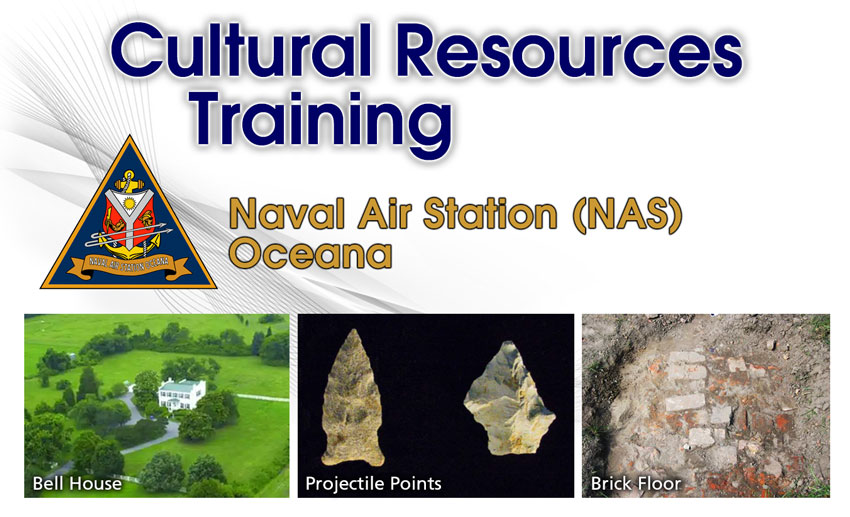 |
Training Created April 2023
- Cultural Resource Laws
- Cultural Resources at NAS Oceana
- Examples of Cultural Resources at NAS Oceana
- Prehistoric and Historic Artifact Examples
- NRHP Resources
- What to Do In Case of Inadvertent Discovery
Click here to take the Cultural Resources Training for NAS Oceana
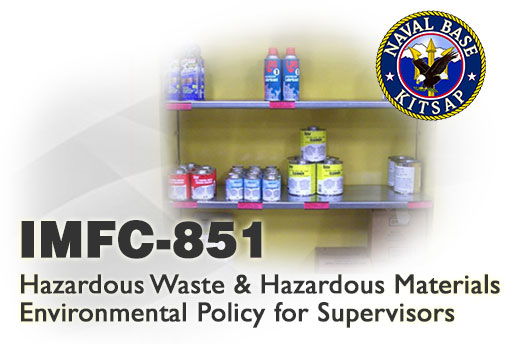 |
Training Updated April 2023
Topics Covered Include:
- Hazardous Material IMF Supervisors Responsibilities
- IMF Hazardous Waste Requestor/Coordinator
- Hazardous Waste Originators
- Spill Response
- Pollution Prevention
- Stormwater
- Resources
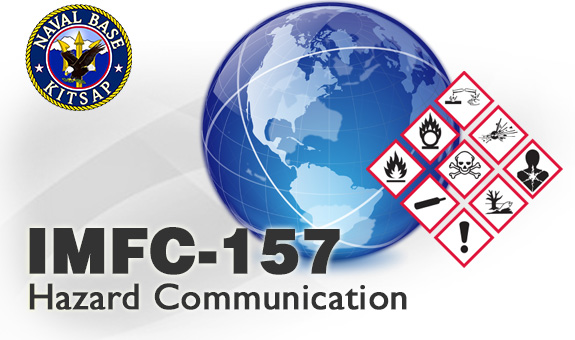 |
Training Updated April 2023
Click here to take the Hazard Communication for Employees (IMFC-157): PSNS and IMF training.
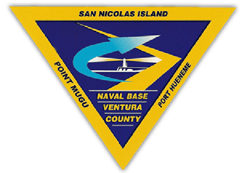 |
Training Updated April 2023
To give you a general introduction to universal waste and to familiarize you with some common universal wastes you may encounter at Naval Base Ventura County (NBVC).
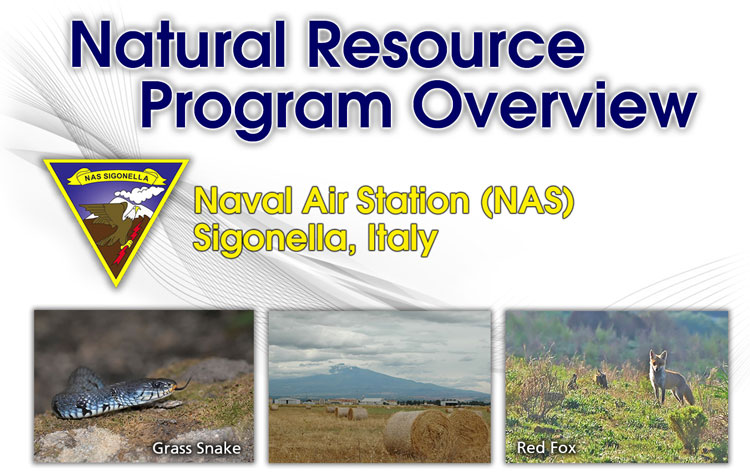 |
Training Created March 2023
- Summarize overseas natural resource compliance requirements
- Provide an overview of the Natural Resource Management Program
- Familiarize personnel with the Natural Resource Management Plan (NRMP)
- Provide general information on local natural resources and protected species
- Identify general natural resource management actions to be completed by environmental staff
Click here to take the Natural Resource Program Overview: NAS Sigonella
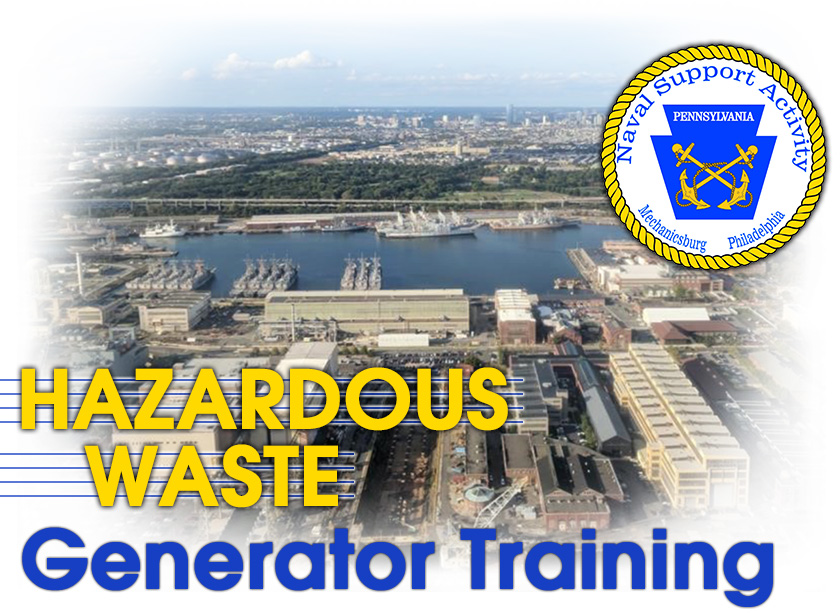 |
Training Created February 2023
- Hazardous Waste Roles & Responsibilities
- Handling and Storage of Waste
- Proper Waste Disposal Procedures
- Prohibitions and Liabilities
- Spill Response and Emergency Procedures
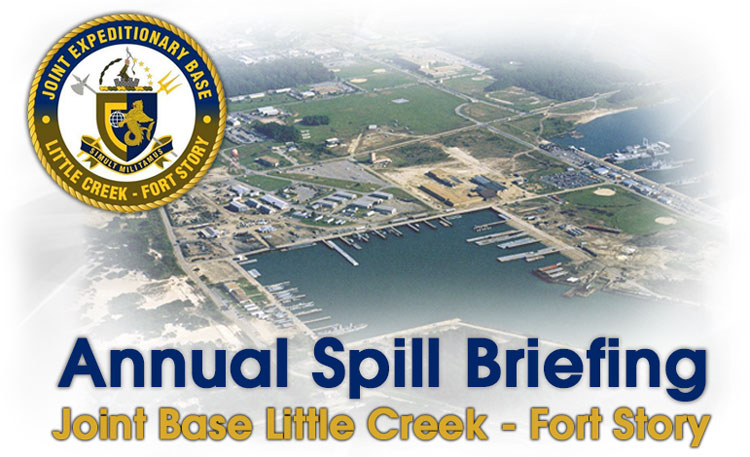 |
Training Updated March 2023
Anyone who is involved in oil handling, transfer, storage, spill response, or maintaining oil filled equipment is expected to be familiar with JEB Little Creek's Spill Prevention Control and Countermeasure Plan (SPCC Plan) and it's contents.
- types of petroleum oil and lubricants (POL)
- labeling requirements for POL storage containers and tanks 55 gallons or greater
- examples of JEB Little Creek Storage Tanks and their spill risks
- areas which have a potential for spills and their spill prevention procedures
- spill prevention procedures for oil transfer operations
- tank inspection requirements
- spill response
- recent spill events at JEB Little Creek
Click here to take your Annual Spill Briefing Training for JEB Little Creek.
 |
Training Updated February 2023
To comply with Executive Orders and U.S. Navy Instruction for Environmental Management Systems (EMS).
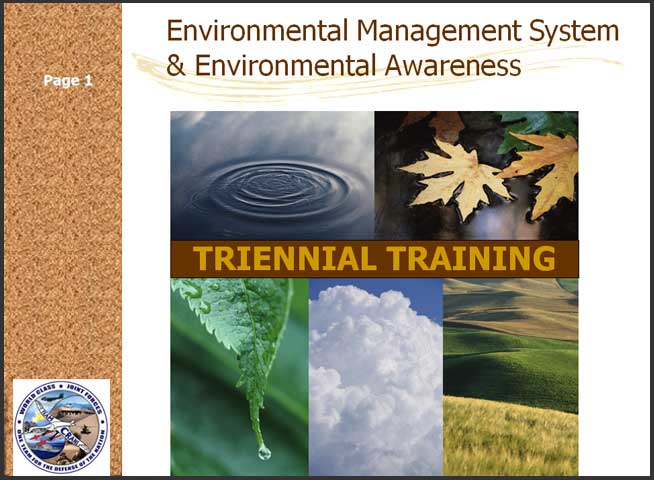 |
Training Updated August January 2023
- Environmental Management System (EMS) for NSA Crane
- Environmental Policy Environmental Aspects, Impacts, and Targets
- Environmental Performance
- How you can help
Have you taken your Environmental Management System and Environmental Awareness Training?
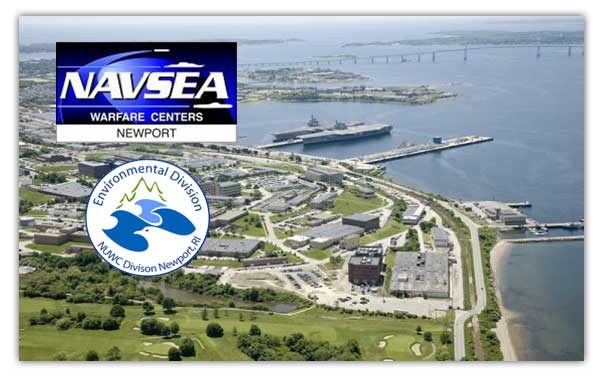 |
Training Updated January 2023
To instruct in Hazardous Waste Management and Emergency Procedures in accordance with the requirements of Title 40 of the Code of Federal Regulations Part 262.17(a)(7).
- Hazardous Waste Identification
- Handling and Storage of Waste
- Proper Waste Disposal Procedures
- Hazardous Waste Roles & Responsibilities
- Prohibitions, Liabilities, and Common Violations
- Spill Response and Emergency Procedures
 |
Training Updated January 2023
To comply with Executive Orders and U.S. Navy Instruction for Environmental Management Systems (EMS).
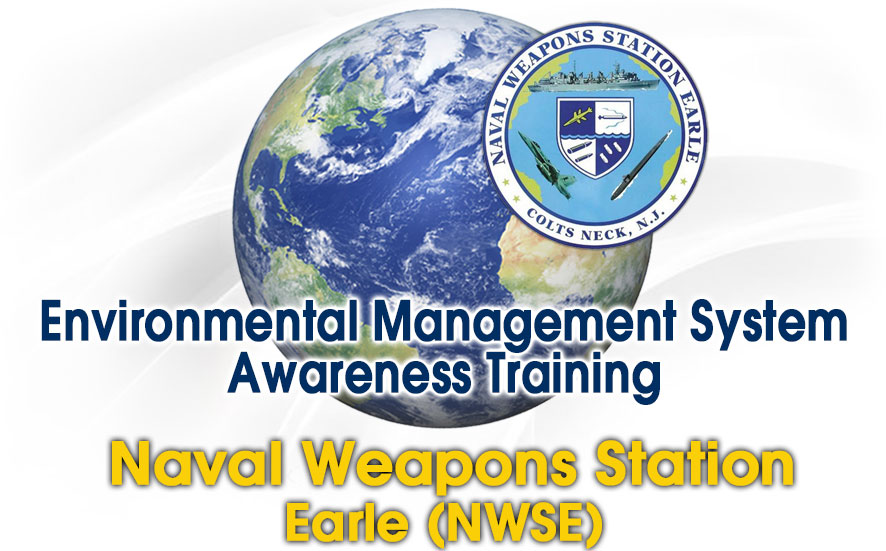 |
Training Updated January 2023
An effective Environmental Management System requires the participation of all Installation Personnel. Every activity can impact the environment.
Click here to take your Environmental Management System Awareness Training for NWSE.
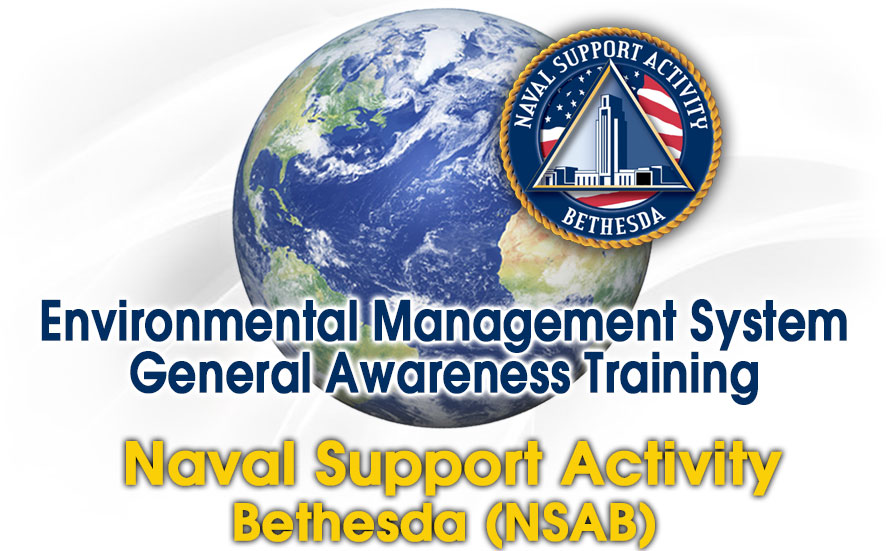 |
Training Updated January 2023
An effective Environmental Management System requires the participation of all Installation Personnel. Every activity can impact the environment.
Click here to take your Environmental Management System Awareness Training for NSAB.
 |
Compliance with 3 different permits/plans;
Do you know Best Management Practices (BMPs) to Prevent Pollution?
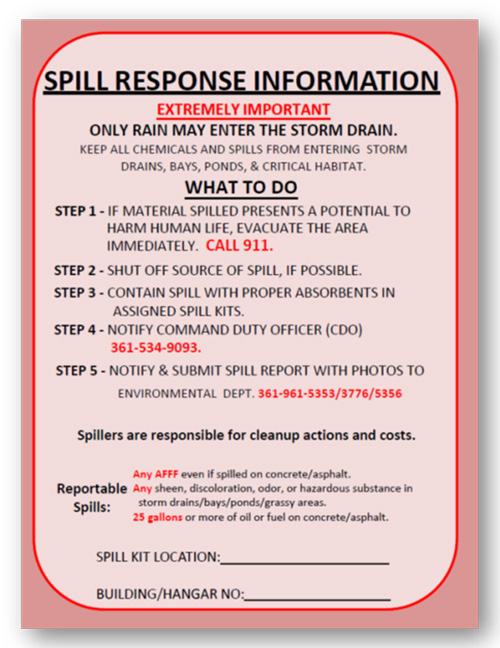 Spill Response Poster |
Training Updated December 2022
40 CFR Part 112, requires:
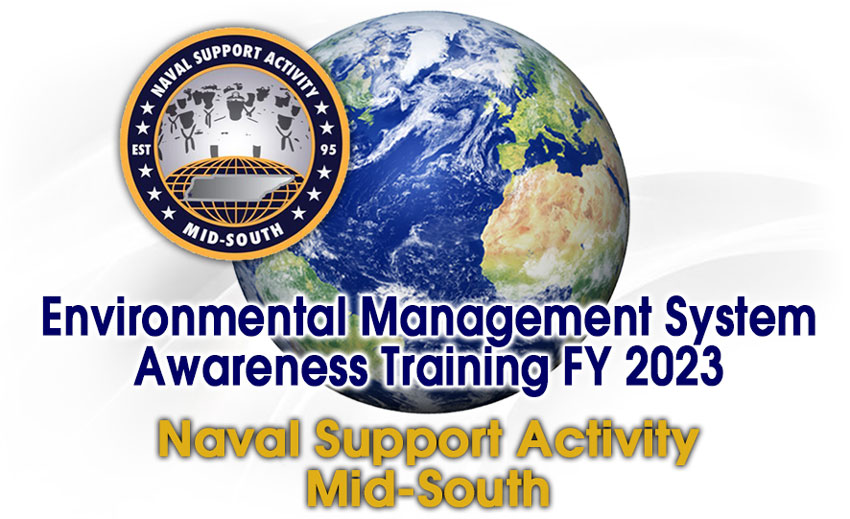 |
Training Updated December 2022
ALL personnel who work on NSA Mid-South
OPNAVINST 5090.1, requires:
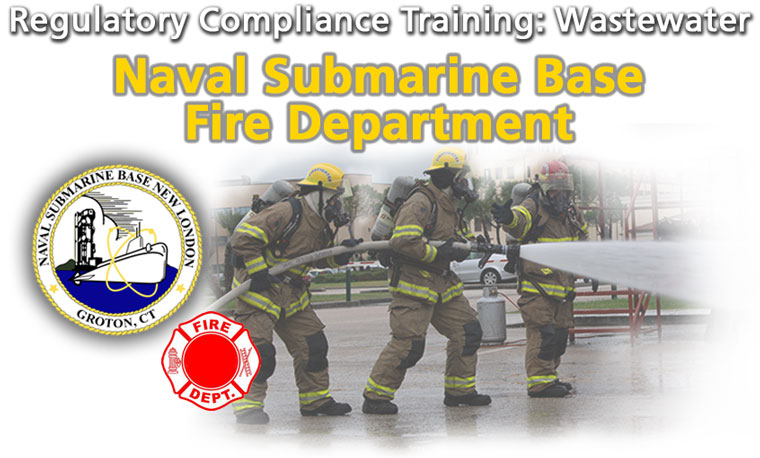 |
Topics Covered:
- Permits
- Discharge Limits
- Monitoring and Reporting
- Notification Requirements
- Fire Suppression Test Requirements
- Environmental Management System
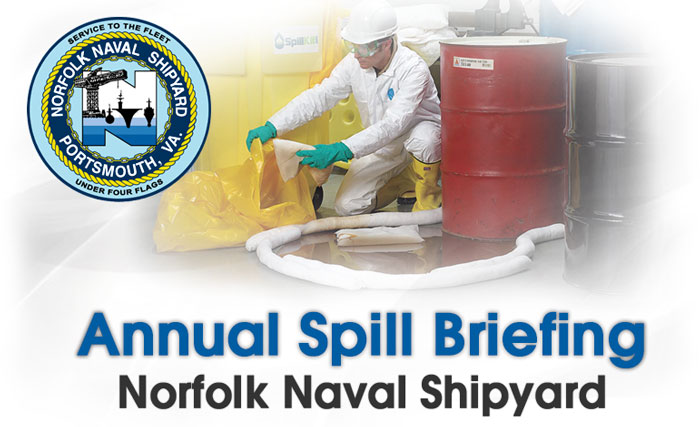 |
Training Updated November 2022
Anyone who is involved in oil handling, transfer, storage, spill response, or maintaining oil filled equipment is expected to be familiar with Norfolk Naval Shipyard's Spill Prevention Control and Countermeasure Plan (SPCC Plan) and its contents.
- types of petroleum oil and lubricants (POL)
- labeling requirements for POL storage containers and tanks 55 gallons or greater
- examples of NNSY Storage Tanks and their spill risks
- areas which have a potential for spills and their spill prevention procedures
- spill prevention procedures for oil transfer operations tank inspection requirements spill response
- recent spill events
Click here to take your Annual Spill Briefing Training for Norfolk Naval Shipyard.
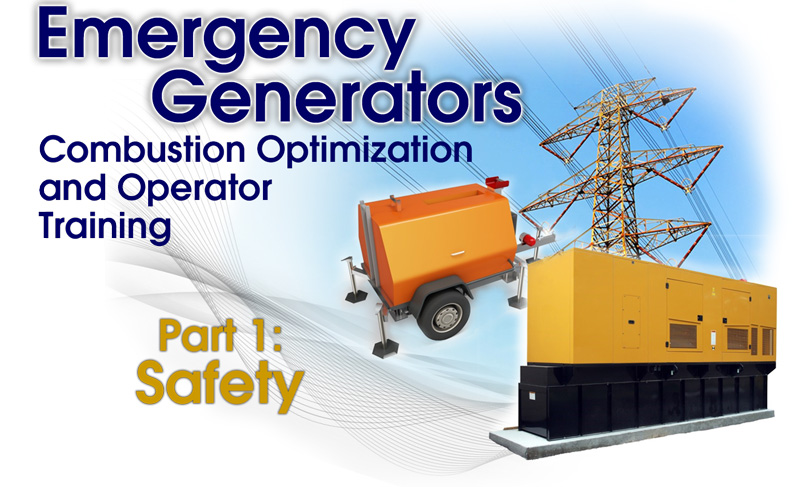 |
Topics Covered:
- Safety
- Air Quality
- Engine Characteristics
- Engine Control Systems
- Troubleshooting
- Off Road Engine Emissions
- Applicable Federal Regulations
- Emergency Generator Maintenance
- Operating Emergency Generators
- Recordkeeping Requirements
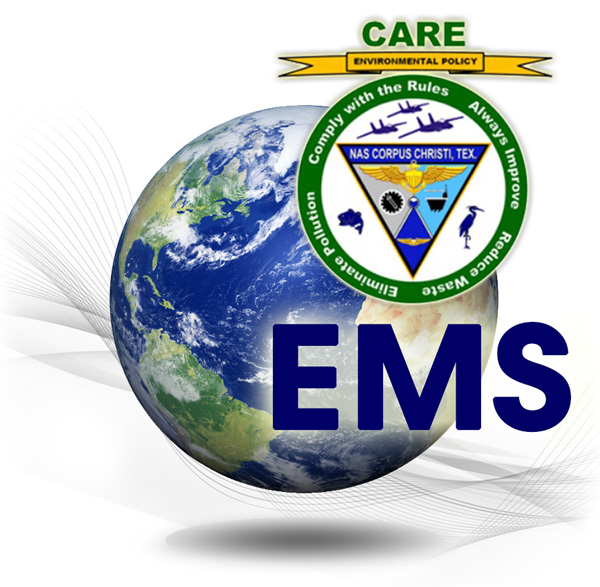 |
In order to comply with OPNAVINST 5090.1, Environmental Readiness Program Policy:
All Navy military, civilian, and contractor personnel should receive initial environmental awareness training and a refresher every 3 years.
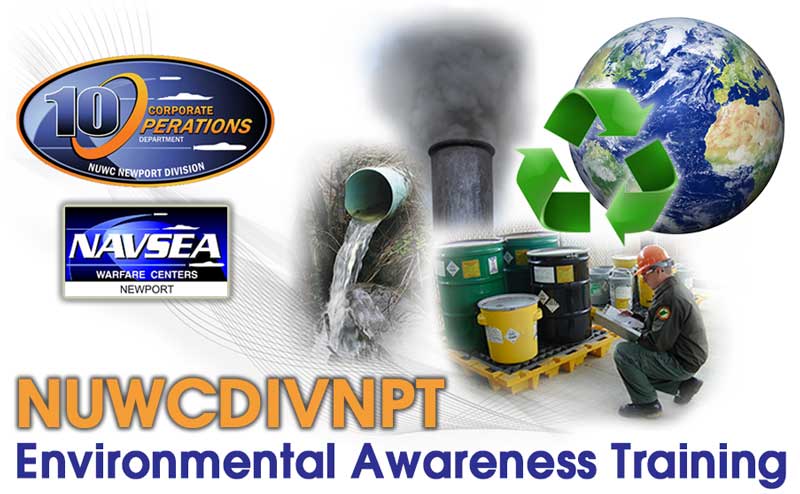 |
Training Created October 2022
To familiarize you with Division Newport environmental programs and the environmental laws and regulations that apply.
- Environmental Management System (EMS)
- Division Newport Significant Environmental Aspects
- National Environmental Policy Act (NEPA) / Executive Order (EO) 12114
- Mission Environmental Planning Program (MEPP)
- Environmental Review Board (ERB)
Click here to take the Environmental Awareness Training for Naval Undersea Warfare Center - Newport
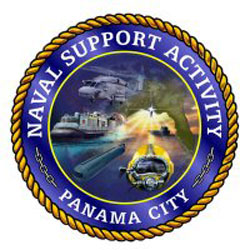 |
Training Updated October 2022
An effective Environmental Management System requires the participation of all Installation Personnel. Every activity can impact the environment.
Click here to take your Environmental Management System Awareness Training for NSA Panama City.
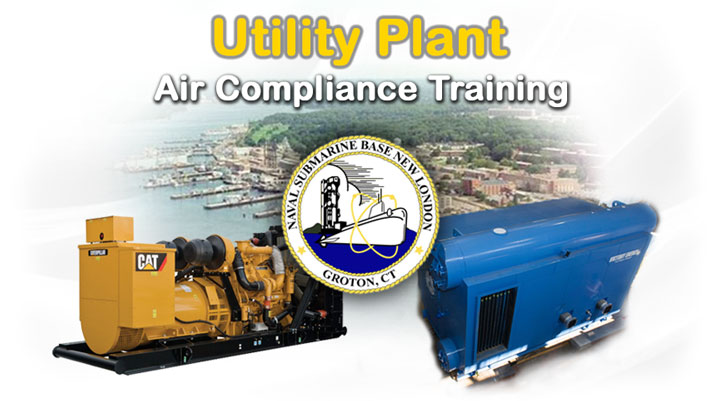 |
The purpose of this training is to describe the applicable requirements for each of the regulated emission sources at the Utility Plant and to define the responsible party for each requirement.
The requirements listed in this training are necessary to comply with all known applicable State and Federal regulations.
 |
Please follow our Instagram Account (ecattstraining) for a light, casual, daily dose of nature, the environment, and environmental awareness.
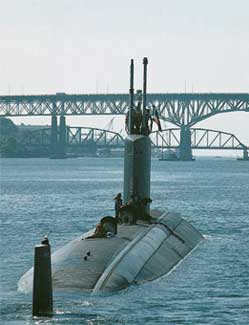 |
Training Updated October 2022
Topics include local and federal HW laws & regulations, penalties, identification, stream profiles, storage areas, containers, labeling, turn-in, recordkeeping, training & safety requirements, and contacts.
 |
Topics Covered:
- Safety
- Air Quality
- Engine Characteristics
- Engine Control Systems
- Troubleshooting
- Off Road Engine Emissions
- Applicable Federal Regulations
- Emergency Generator Maintenance
- Operating Emergency Generators
- Recordkeeping Requirements
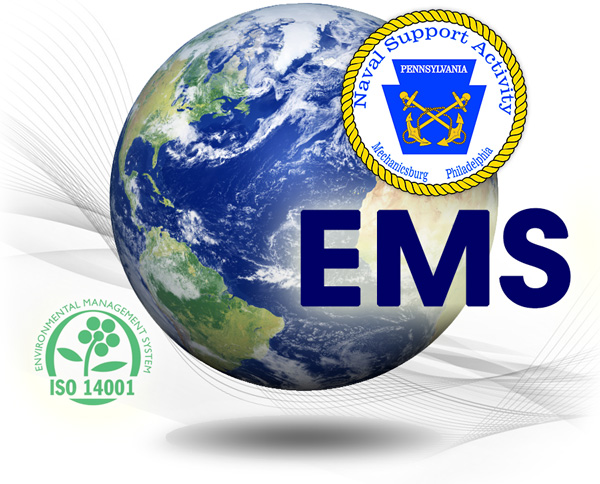 |
Training Created October 2022
This is an EMS refresher course for NSA Mechanicsburg, NSA Philadelphia, Philadelphia Navy Yard Annex.
Topics include your role & responsibilities in the EMS, the EMS Policy Statement, and Significant Environment Aspects.
 |
Training Updated September 2022
This is an EMS initial and refresher course for Joint Expeditionary Base Little Creek-Fort Story.
Topics include your role & responsibilities in the EMS, the EMS Policy Statement, and Significant Environment Aspects.
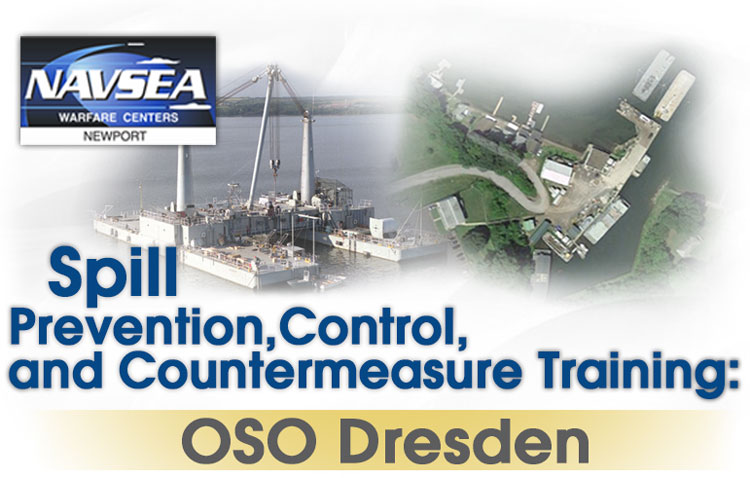 |
Training Created August 2022
40 CFR Part 112, requires all personnel who handle oil products take spill training.
Topics include the SPCC Plan, oil storage, prevention and cleanup of spills, spill pathways, spill response equipment, training requirements, and record keeping.
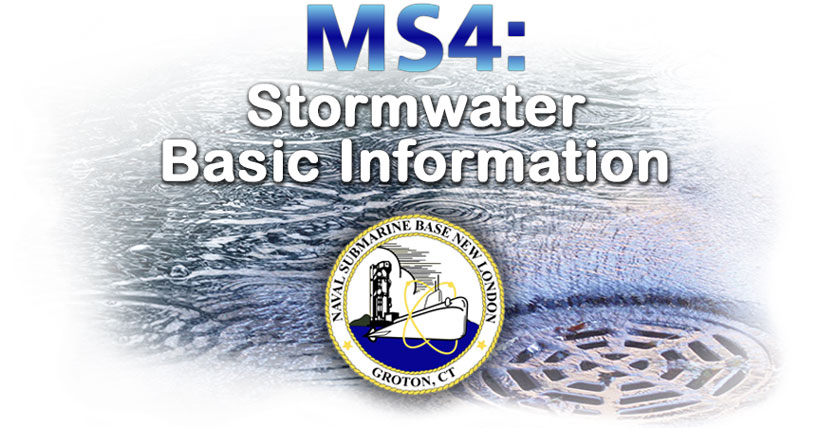 |
Training Created July 2022
This is an introductory course on the topic of stormwater and MS4s.
In this training you will learn basic topics such as what stormwater is, why stormwater is a problem, what can be done about reducing pollutants in stormwater, and you will watch a video about stormwater pollution.
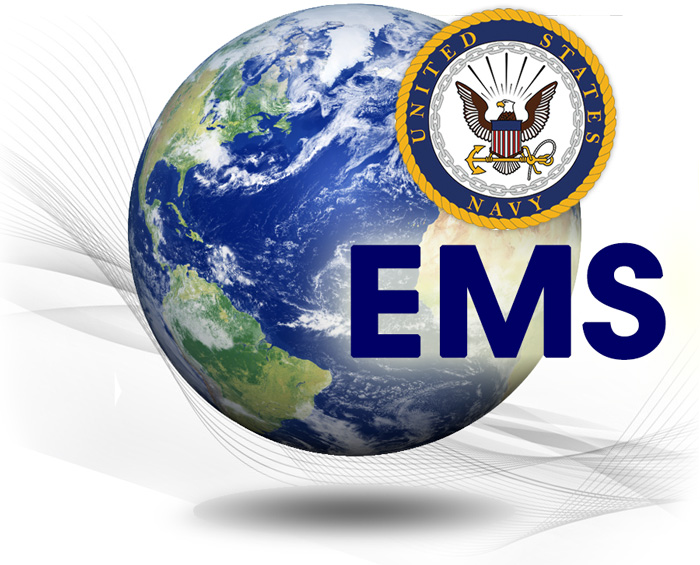 |
SECNAV POLICY 5090.8A
- In support of the national defense mission and to restore, protect, and enhance the quality of the environment for current and future generations, it is DoN policy to: Integrate environmental protection, natural resources, and cultural resources program considerations into all DoN operations and activities, as appropriate.
- In accordance with DoD Directive 4715.1E Environment, Safety, and Occupational Health (19 Mar 05), the US Armed Forces must be well prepared for their national defense mission and at the same time must act in an environmentally responsible manner.
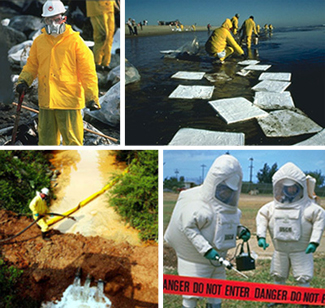 |
The video in this training is an overview of the duties of the first responder in a hazardous materials accident. The video addresses the information that a first responder should obtain before calling the emergency dispatcher.
* Please note that you should review your facility's plans and contact your supervisor for the most accurate and up-to-date information for your location.
Below are some topics you should be familiar with after finishing this training.
- Understand "hazardous substances" and the risks associated with them in an accident.
- Identify the "hazardous substances," if possible.
- Understand the role of the first responder awareness level in the employer's emergency response plan.
- Understand the potential outcomes associated with an emergency created when "hazardous substances" are present.
- Realize the need for additional resources and make the appropriate notifications to the facility communications center.
- Understand site security and control.
 |
Training Updated March 2022
40 CFR Part 112, requires:
Click here to take your Spill Prevention Control and Countermeasures Training for JEB Little Creek.
 |
Training Updated March 2022
Anyone who is involved in oil handling, transfer, storage, spill response, or maintaining oil filled equipment is expected to be familiar with JEB Little Creek's Spill Prevention Control and Countermeasure Plan (SPCC Plan) and it's contents.
- types of petroleum oil and lubricants (POL)
- labeling requirements for POL storage containers and tanks 55 gallons or greater
- examples of JEB Little Creek Storage Tanks and their spill risks
- areas which have a potential for spills and their spill prevention procedures
- spill prevention procedures for oil transfer operations
- tank inspection requirements
- spill response
- recent spill events at JEB Little Creek
Click here to take your Annual Spill Briefing Training for JEB Little Creek.
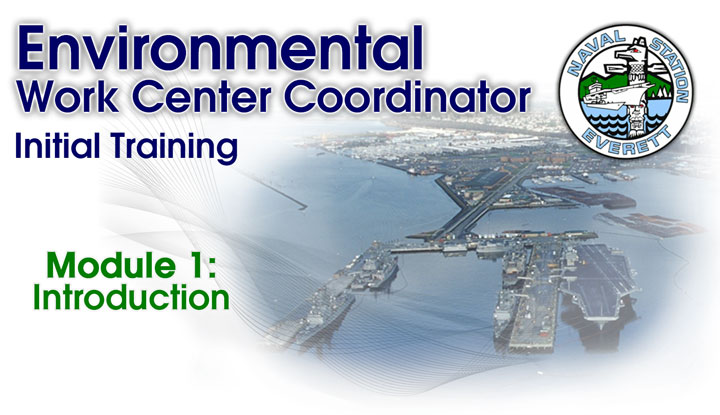 |
Topics Covered:
- EWCC Required Training
- EWCC Duties
- Hazardous Waste
- Hazardous Materials
- Spills
- Stormwater
- Environmental Management System Awareness
- Recycling
 |
Training Updated March 2022
Anyone who is involved in oil handling, transfer, storage, spill response, or maintaining oil filled equipment is expected to be familiar with Norfolk Naval Shipyard's Spill Prevention Control and Countermeasure Plan (SPCC Plan) and it's contents.
- types of petroleum oil and lubricants (POL)
- labeling requirements for POL storage containers and tanks 55 gallons or greater
- examples of NNSY Storage Tanks and their spill risks
- areas which have a potential for spills and their spill prevention procedures
- spill prevention procedures for oil transfer operations tank inspection requirements spill response
- recent spill events
Click here to take your Annual Spill Briefing Training for Norfolk Naval Shipyard.
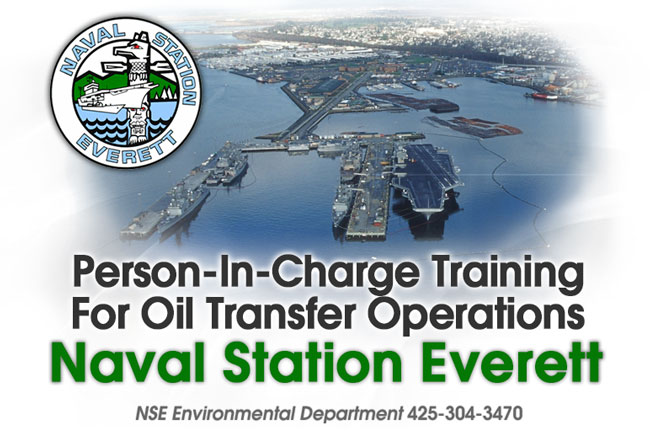 |
Training Created March 2022
Persons In Charge (PIC) for Oil Transfers at NAVSTA Everret.
- Oil Transfer Regulations
- Applicable Local, State, and Federal Regulations
- NAVSTA Everett Operations Manual
- Person In Charge (PIC) Designations and Qualifications
- Departments and Agencies involved with Oil Transfer Operations
- Standard Operating Procedures
Click here to take the Person-In-Charge Training For Oil Transfer Operations at NAVSTA Everett.
 |
Training Updated for 2022
Course Objectives
- Meet the 40 CFR 112.7(f)(1) training requirements
- Inform oil-handlers what to do when a release occurs as identified in the facility Spill Prevention, Control, and Countermeasures (SPCC) Plan
- Explain applicable Federal and State Compliance standards to oil-handlers and tank inspectors
- Raise awareness about petroleum related spills and develop lessons learned with the goal of preventing future spills
- Review examples of typical releases and typical fuel storage concerns
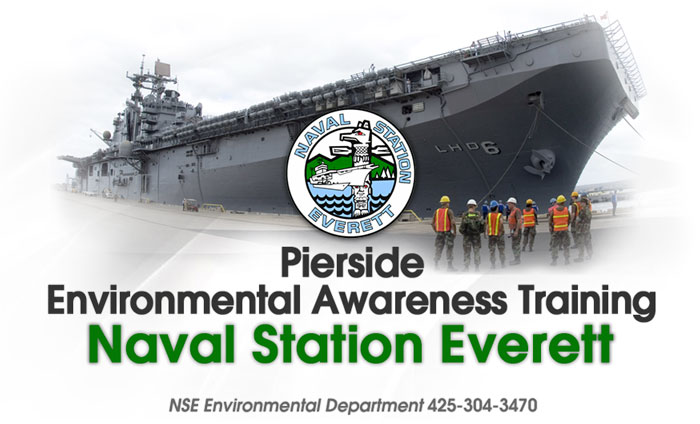 |
Training Created March 2022
To provide basic environmental awareness to ship personnel while operating pierside at Navy installations.
- Introduction: Why You Need This Training
- Examples of Non-compliance
- Port Environmental Manuals (PEMs)
- Spills and Releases
- Spills
- Spill Prevention
- Painting and Paint Removal Ops
- Used/Excess Hazardous Materials
- Hazardous Waste
- Solid Waste
- Solid Waste and Recycling
- Marine and Pierside Wildlife
- Beyond the Pier
Click here to take your Pierside Environmental Awareness Training for NAVSTA Everett.
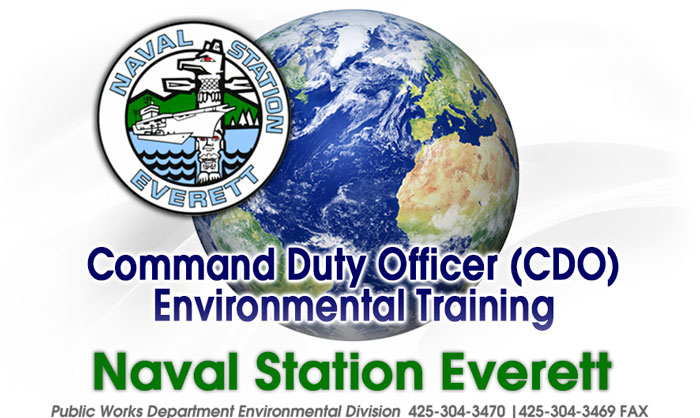 |
Training Updated March 2022
- Regulatory Requirements
- General CDO Environmental Duties
- General Spill Response Actions
- Storm Drain Sluice Gate Valves
- Stormwater Outfall Locations
- Stormwater Pollution Prevention
- Hazardous Waste Recycling
- Odors
- Animals
Click here to take your Command Duty Officer (CDO) Environmental Training for NAVSTA Everett.
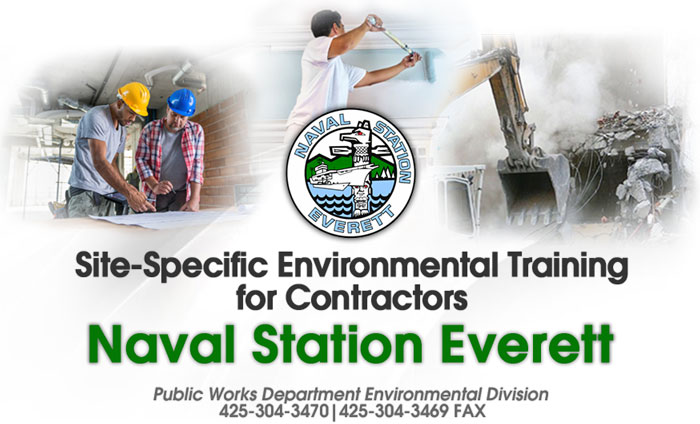 |
Training Updated March 2022
Who is required to take this training?
- All Contractors working at Naval Station Everett
Topics Included:
- General Requirements
- Spills
- Oil Spill Prevention Control And Countermeasure (SPCC)
- Storm Water Pollution Prevention Plan (SWPP)
- Refueling Equipment On Piers
- Management Of Hazardous Materials
- Solid Waste & Recycling
- Hazardous Waste Management
- Oil And Waste Water Transfers
- Air Pollution Control And Reporting
- Drinking Water
- Removal Of Sea Growth From Vessels, Barges, And Other Marine Apparatus
- Dead, Injured Or Stranded Marine Animals
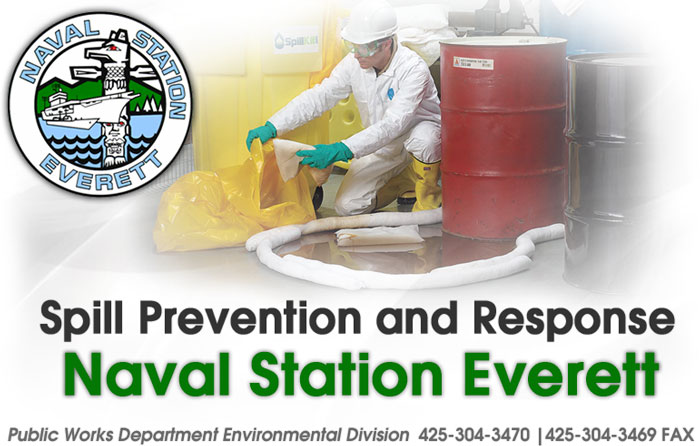 |
Training Created March 2022
To familiarize all personnel working and living at NAVSTA Everett with spill prevention practices, spill incident categories, and spill response actions.
- Spill Prevention
- Spill Incident Categories
- Non-Emergency Spills
- Non-Emergency Spill Response
- Emergency Spills
- Emergency Spill Response
Click here to take your Spill Prevention and Response Training for NAVSTA Everett.
 |
Training Updated February 2022
To instruct in Hazardous Waste Management and Emergency Procedures in accordance with the requirements of Title 40 of the Code of Federal Regulations Part 262.17(a)(7).
- Hazardous Waste Identification
- Handling and Storage of Waste
- Proper Waste Disposal Procedures
- Hazardous Waste Roles & Responsibilities
- Prohibitions, Liabilities, and Common Violations
- Spill Response and Emergency Procedures
 Gray Wolf |
**** UPDATED ****
Following a February 10, 2022, court order, gray wolves in the contiguous 48 states and Mexico with the exception of the Northern Rocky Mountain population are now protected under the Endangered Species Act (ESA) as threatened in Minnesota and endangered in the remaining states.
Have you taken your Natural Resources training?
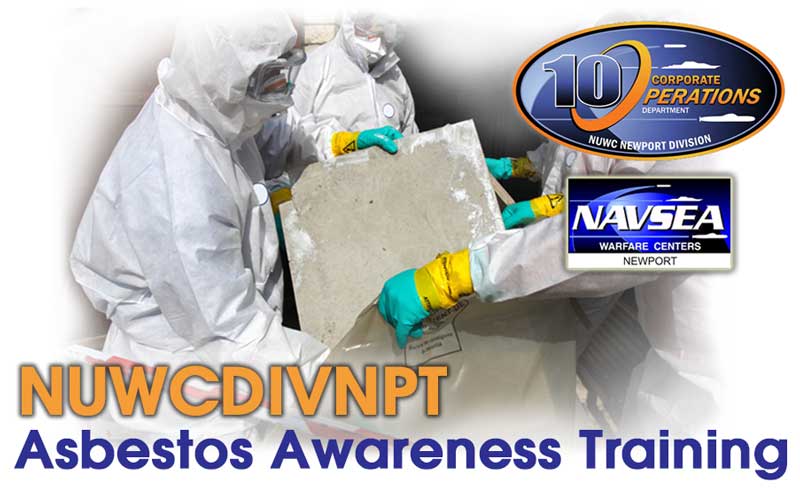 |
Training Created February 2022
All Navy personnel and contractors who work in areas where there is a potential for asbestos exposure.
- Know the origin of asbestos and its properties
- Be able to identify the locations and operations which potential asbestos-containing materials could be present
- Understand the health effects associated with asbestos exposure
- Know the roles of the primary agencies that regulate asbestos
- Understand the limits of asbestos survey information
- Become familiar with the purpose and proper use of respirators and protective clothing; if appropriate*
- Be capable of recognizing asbestos hazards
- Be qualified to perform OSHA Class IV asbestos work
- Understand the different engineering controls and work practices associated with job assignments in order to be able to work safely in a building with ACMs
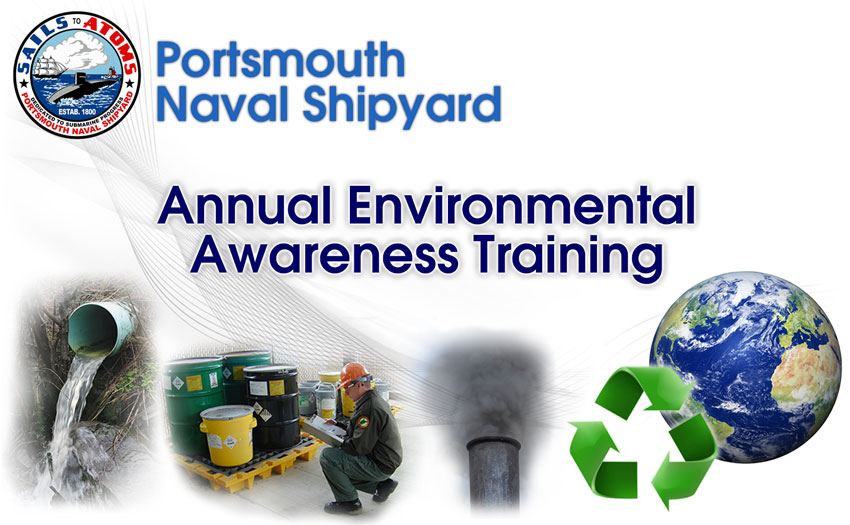 |
Training Created January 2022
To familiarize all personnel working and living at Portsmouth Naval Shipyard with the Environmental Program
- Environmental Management System (EMS)
- Stormwater Pollution Prevention
- Wastewater Pollution Prevention
- Air Quality Hazardous Material Hazardous Waste (including PCBs and Universal Waste)
- Spill Prevention and Response
- Qualified Recycling Program
Have you taken your Annual Environmental Awareness Training?
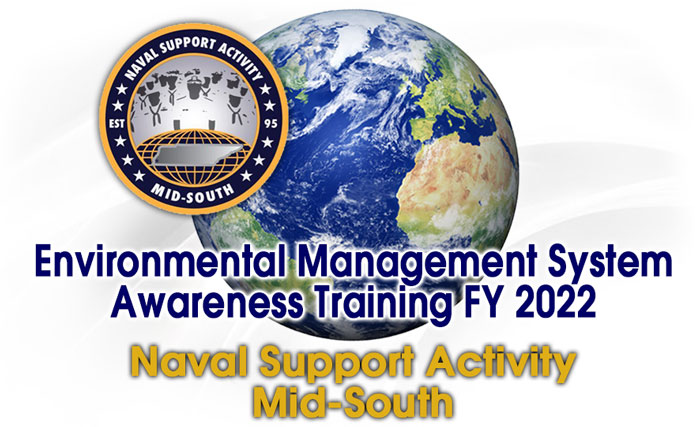 |
Training Updated January 2022
ALL personnel who work on NSA Mid-South
OPNAVINST 5090.1, requires:
 |
Training Updated November 2021
Why are we doing this training
- To provide training for Waste Originators to handle and properly dispose of regulated waste at NBK Bangor, NH Bremerton, and Jackson Park
Who is required to complete this training?
- To provide training for Waste Originators to handle and properly dispose of regulated waste at NBK Bangor, NH Bremerton, and Jackson Park
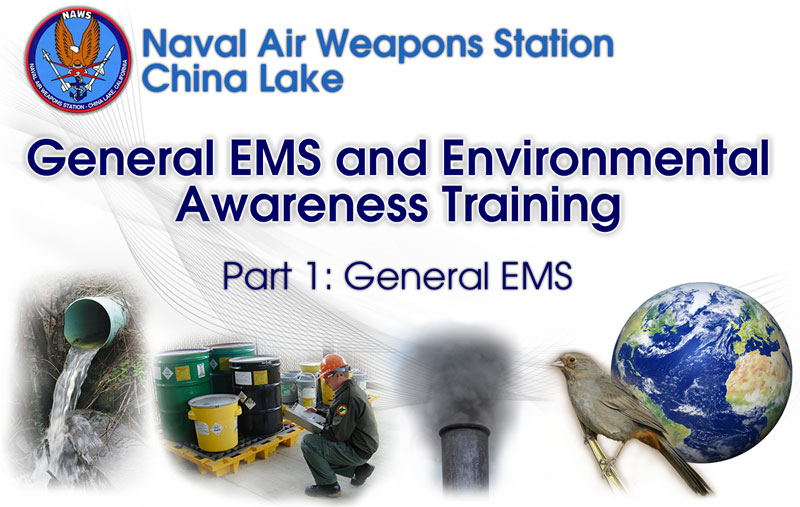 |
Training Created October 2021
Why are we doing this training?
OPNAVINST M-5090.1E 17-3.2.g.(2) requires:
Have you taken your NAWS China Lake EMS and Environmental Awarness Training?
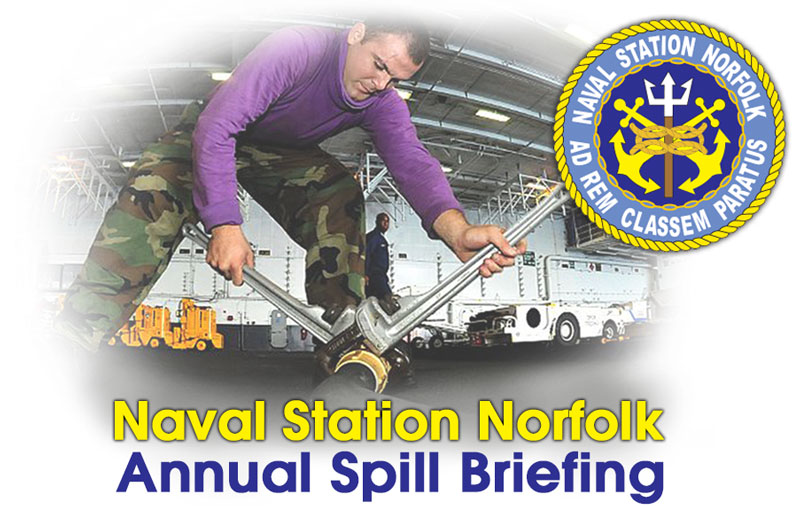 |
Updated Training for 2021
All Facility oil handling personnel on Installations.
40 CFR 112.7(f)(1) requires training for oil-handling personnel in the operation and maintenance of equipment to prevent discharges; discharge procedure protocols; applicable pollution control laws, rules, and regulations; general facility operations; and the contents of the facility SPCC Plan.
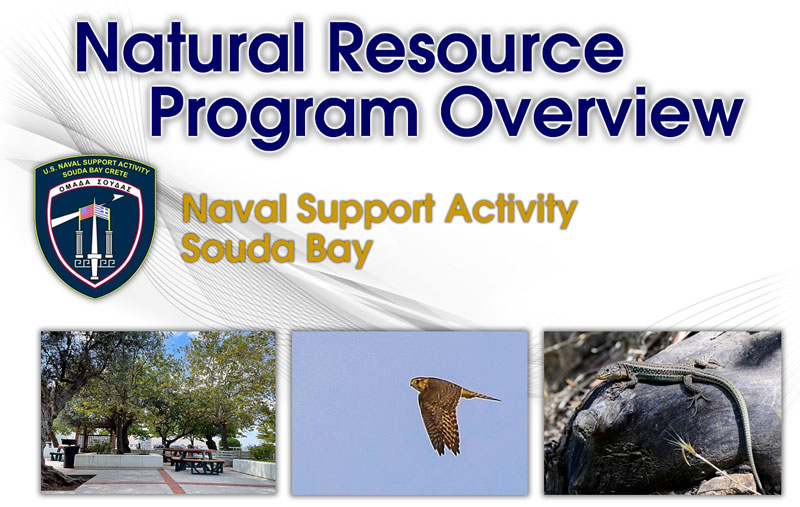 |
Training Created October 2021
- To summarize overseas natural resource compliance requirements
- To provide an overview of the Natural Resource Management Program
- To familiarize personnel with the Natural Resource Management Plan (NRMP)
- To provide general information on local natural resources and protected species
- To identify general natural resource management actions to be completed by environmental staff
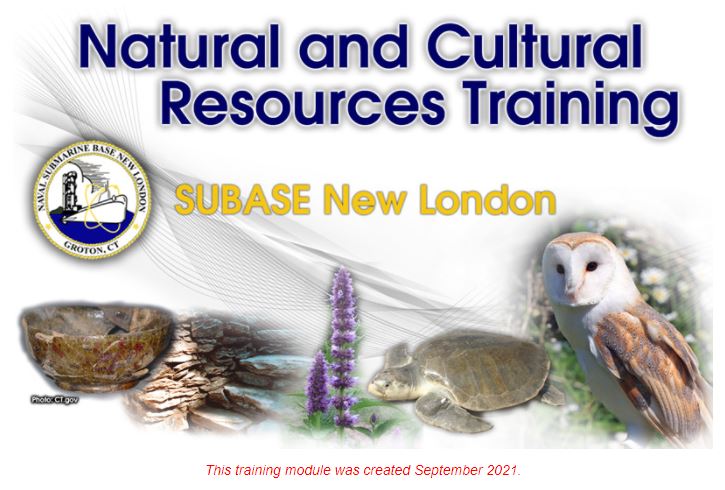 |
Training Created September 2021
- To familiarize all personnel working and living at SUBASE New London with requirements that must be adhered to in order to comply with laws protecting natural and cultural resources
- To provide general information on local natural resources and protected species
- To provide general information on local cultural resources
- To provide resources to help you find additional information on natural and cultural resources which may be found on SUBASE New London
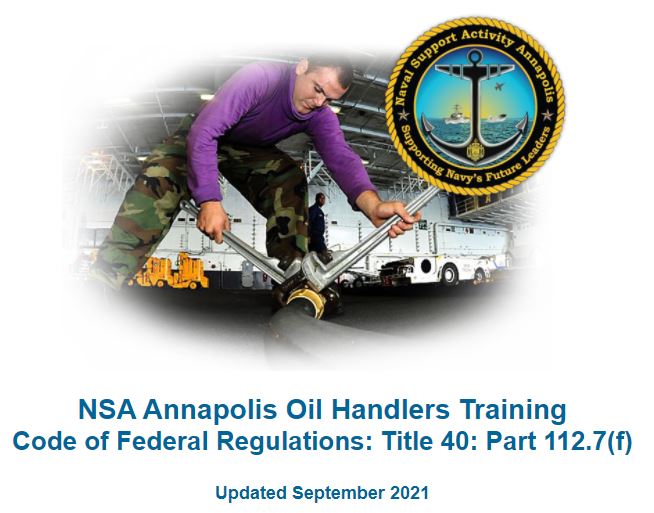 |
Updated Training for 2021
All Facility oil handling personnel on Installations.
40 CFR 112.7(f)(1) requires training for oil-handling personnel in the operation and maintenance of equipment to prevent discharges; discharge procedure protocols; applicable pollution control laws, rules, and regulations; general facility operations; and the contents of the facility SPCC Plan.
 |
Training Created September 2021
- To summarize overseas natural resource compliance requirements
- To provide an overview of the Natural Resource Management Program
- To familiarize personnel with the Natural Resource Management Plan (NRMP)
- To provide general information on local natural resources and protected species
- To identify general natural resource management actions to be completed by environmental staff
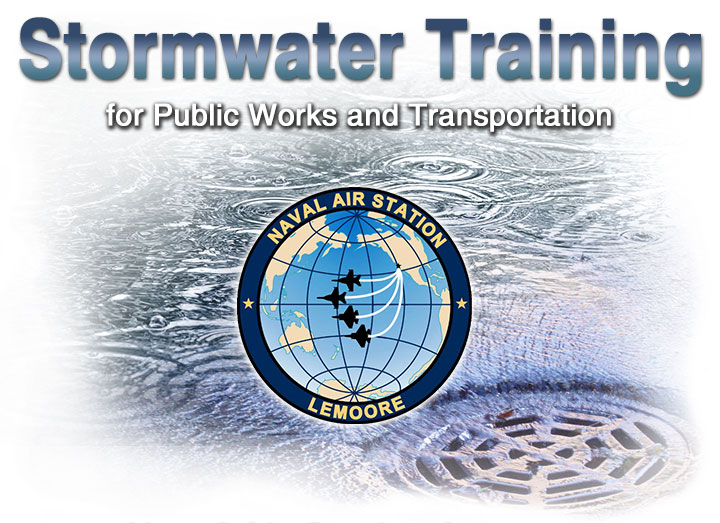 |
Training Created August 2021
- To help you understand the goals of the NAS Lemoore stormwater program
- To provide information on where to obtain the Stormwater Pollution Prevention Plan (SWPPP)
- To help you understand what actions need to be taken to protect stormwater quality
- To provide resources to help you find additional information and contacts for all stormwater issues
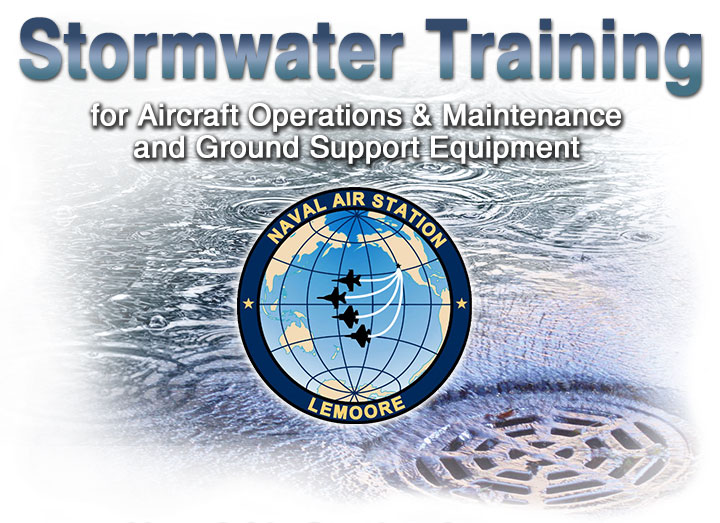 |
Training Created August 2021
- To help you understand the goals of the NAS Lemoore stormwater program
- To provide information on where to obtain the Stormwater Pollution Prevention Plan (SWPPP)
- To help you understand what actions need to be taken to protect stormwater quality
- To provide resources to help you find additional information and contacts for all stormwater issues
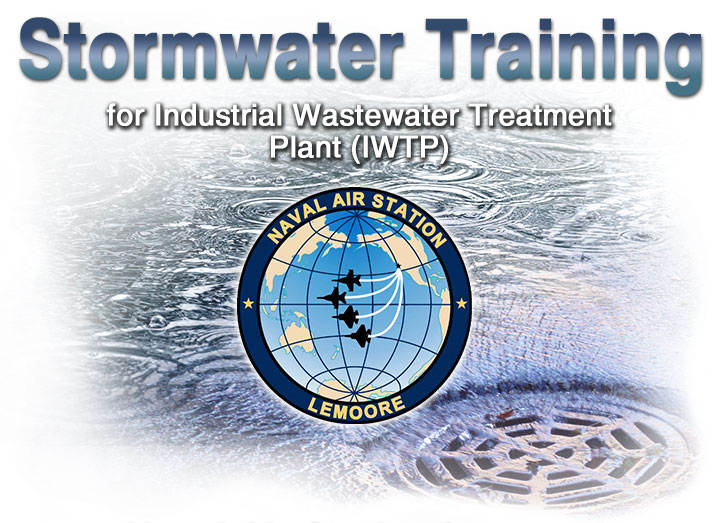 |
Training Created August 2021
- To help you understand the goals of the NAS Lemoore stormwater program
- To provide information on where to obtain the Stormwater Pollution Prevention Plan (SWPPP)
- To help you understand what actions need to be taken to protect stormwater quality
- To provide resources to help you find additional information and contacts for all stormwater issues
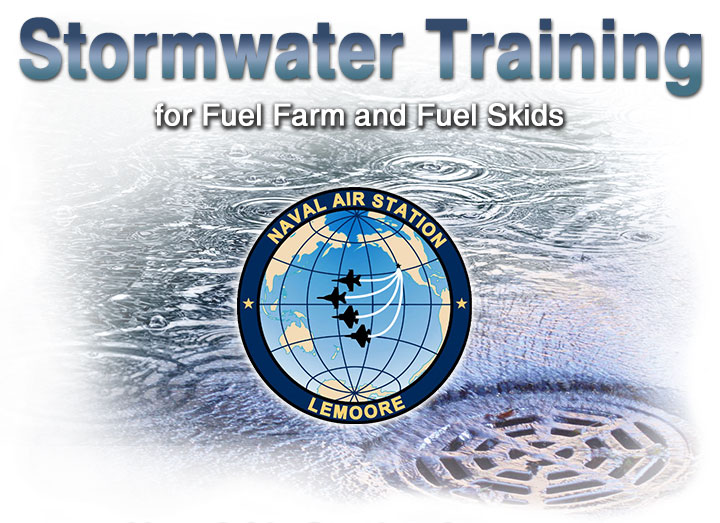 |
Training Created August 2021
- To help you understand the goals of the NAS Lemoore stormwater program
- To provide information on where to obtain the Stormwater Pollution Prevention Plan (SWPPP)
- To help you understand what actions need to be taken to protect stormwater quality
- To provide resources to help you find additional information and contacts for all stormwater issues
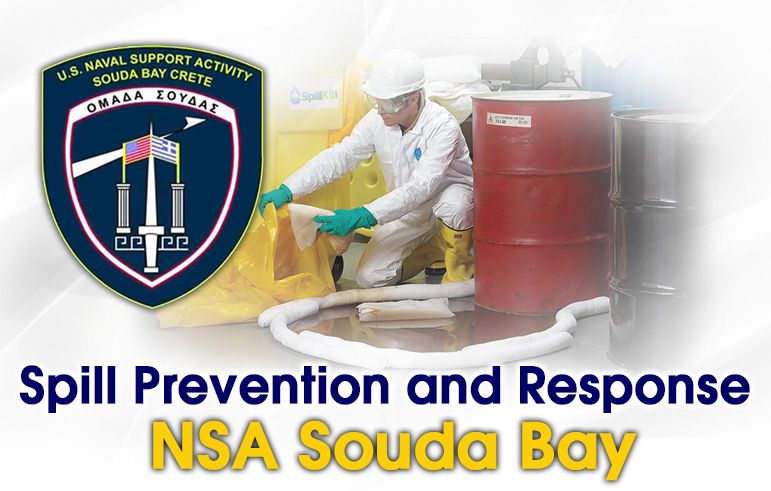 |
Training Updated February 2021
NSA Souda Bay's Spill Prevention and Response Plan (SPRP) requires:
All oil-handling personnel to be trained in oil spill prevention.
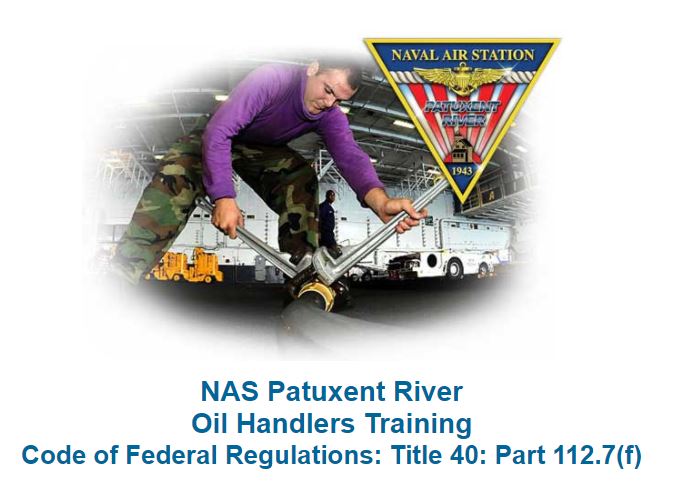 |
Updated Training for 2021
All Facility oil handling personnel on Installations.
40 CFR 112.7(f)(1) requires training for oil-handling personnel in the operation and maintenance of equipment to prevent discharges; discharge procedure protocols; applicable pollution control laws, rules, and regulations; general facility operations; and the contents of the facility SPCC Plan.
 |
Training Updated January 2021
OPNAVINST 5090.1, requires:
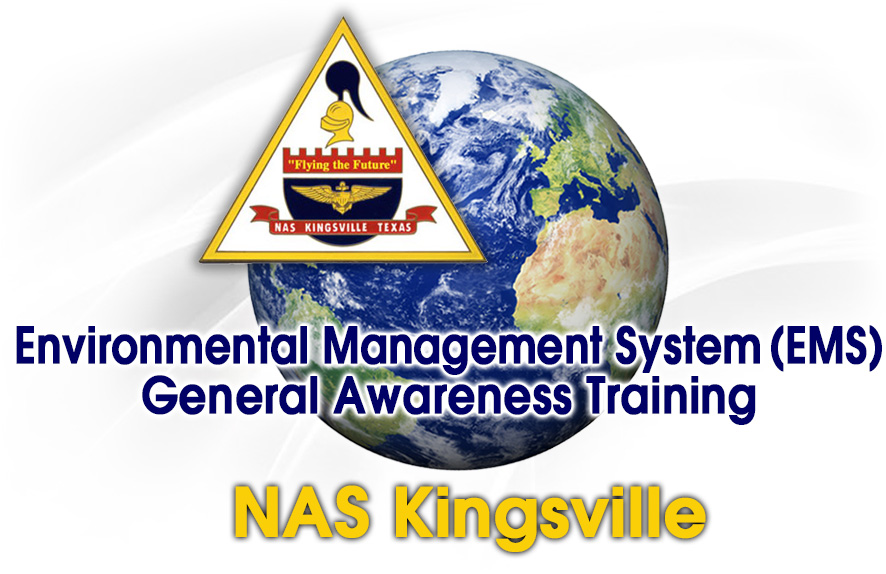 |
Training Updated January 2021
OPNAVINST 5090.1, requires:
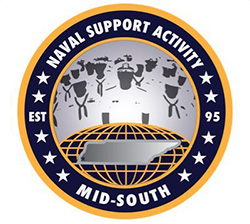 |
Training Updated November 2020
Why are we doing this training?
OPNAVINST 5090.1, requires:
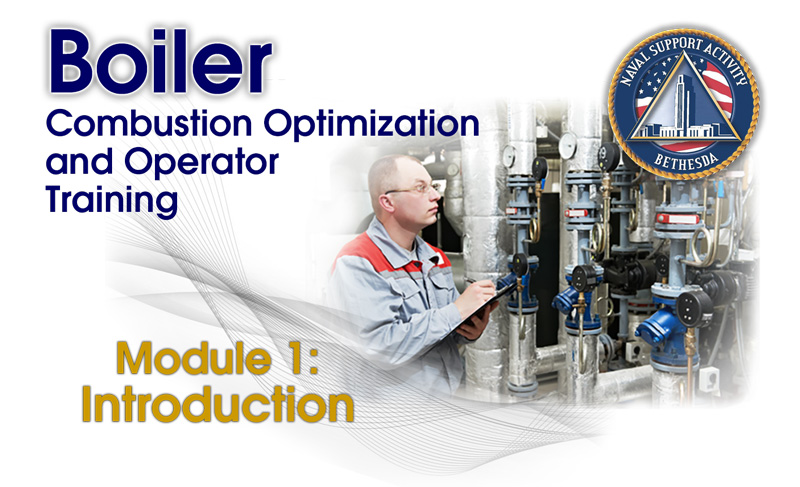 |
New Training November 2020
Why are we doing this training?
Required under the following:
- COMAR 26.11.09.08E(4): Once every 3 years, requires each operator of the installation to attend operator training programs on combustion optimization that are sponsored by the Department, the EPA, or equipment vendors
- COMAR 26.11.09.08B(5)(a): The equipment operator to be trained may be the person who maintains the equipment and makes the necessary adjustments for efficient operation
Have you taken your training?
| Part 1 | Part 2 | Part 3 | Part 4 | Part 5 | Part 6 | Part 7 | Part 8 | Part 9 | Part 10 | Part 11 |
Connecticut UST Class C Certification Program
|
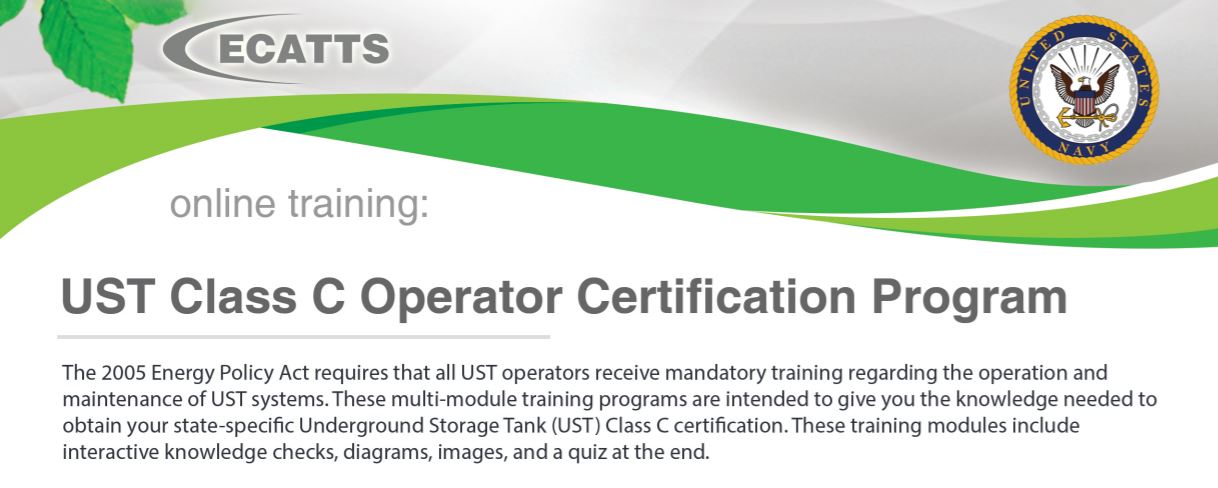 Click here for the Training Flyer Mississippi UST Class C Certification Program
|
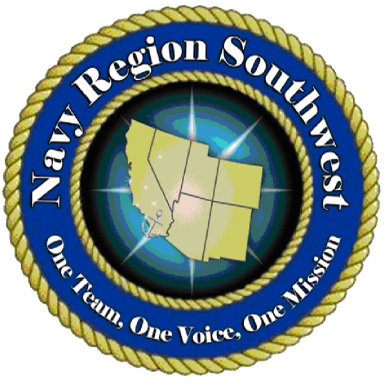 |
OPNAVINST 5090.1e, Chapter 3, requires:
 Spill Response Poster |
Training Updated October 2020
40 CFR Part 112, requires:
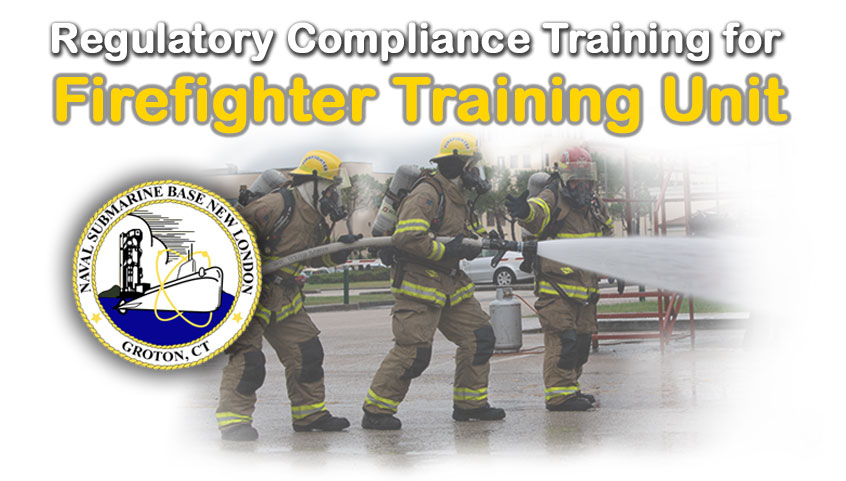 |
Naval Submarine Base New London Regulatory Overview & Regulatory Oversight
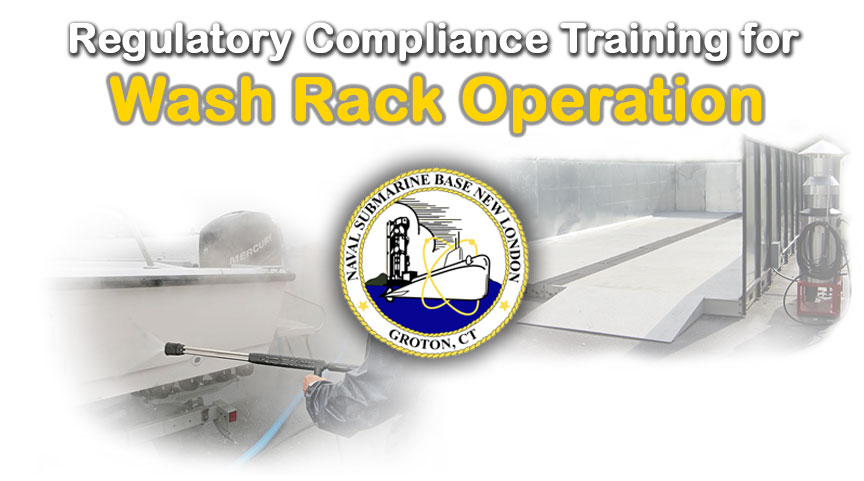 |
Naval Submarine Base New London Regulatory Overview & Regulatory Oversight
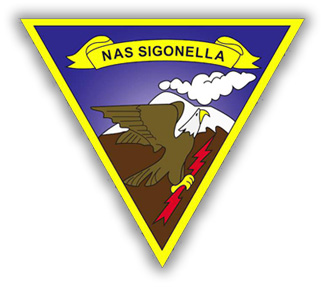 |
Training Updated September 2020
OPNAV-M 5090.1 (Environmental Readiness Manual), requires:
 |
Compliance with 3 different permits/plans;
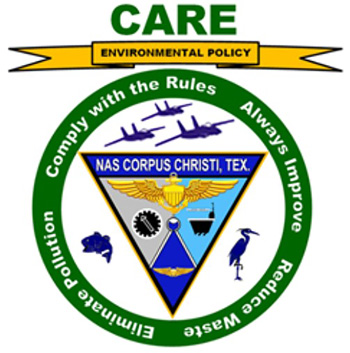 Key Concepts of EMS Policy |
Training Updated August 2020
OPNAVINST 5090.1, requires:
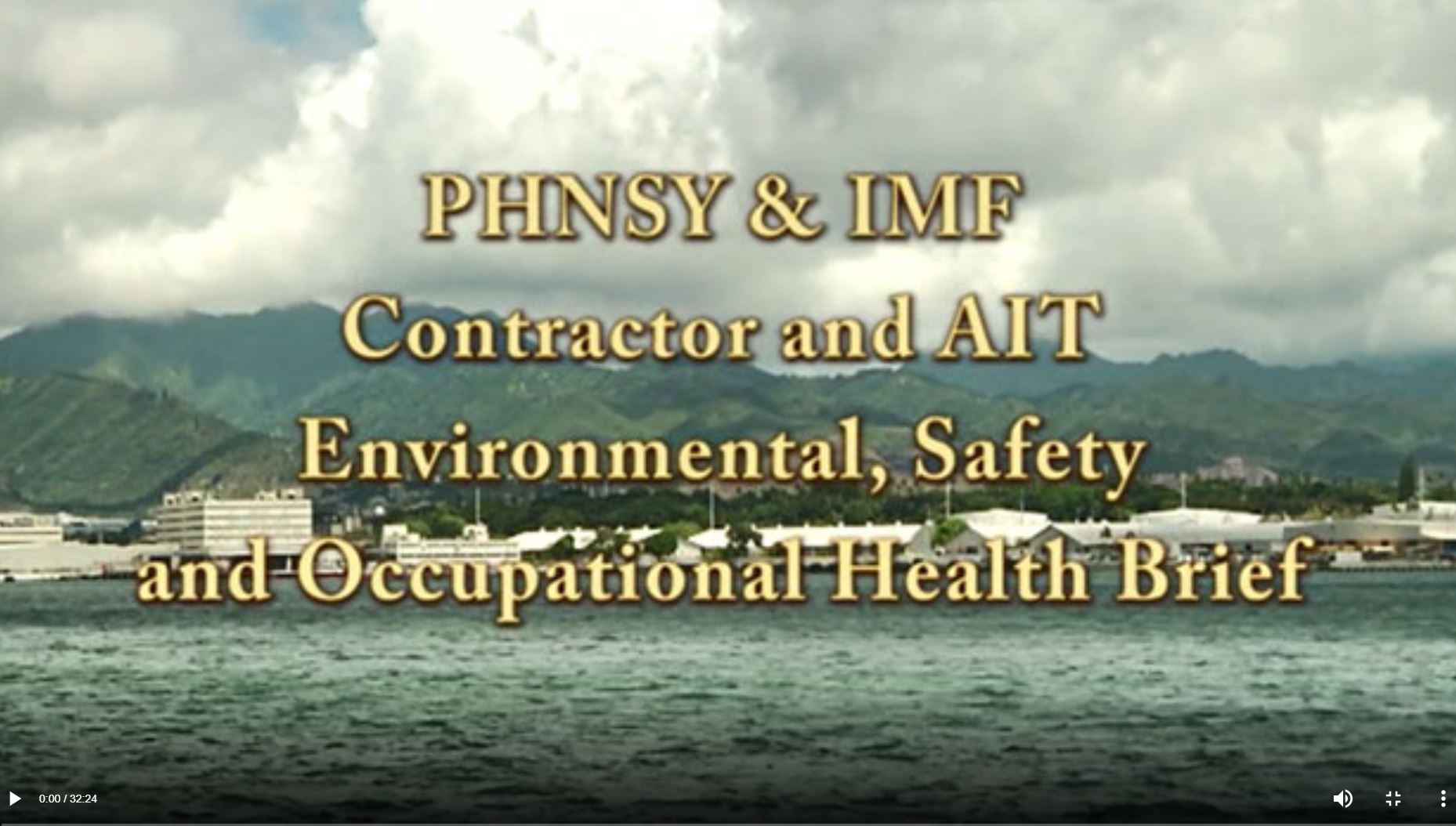 |
Visiting entities performing work at Pearl Harbor Naval Shipyard and Intermediate Maintenance Facility (PHNSY&IMF).
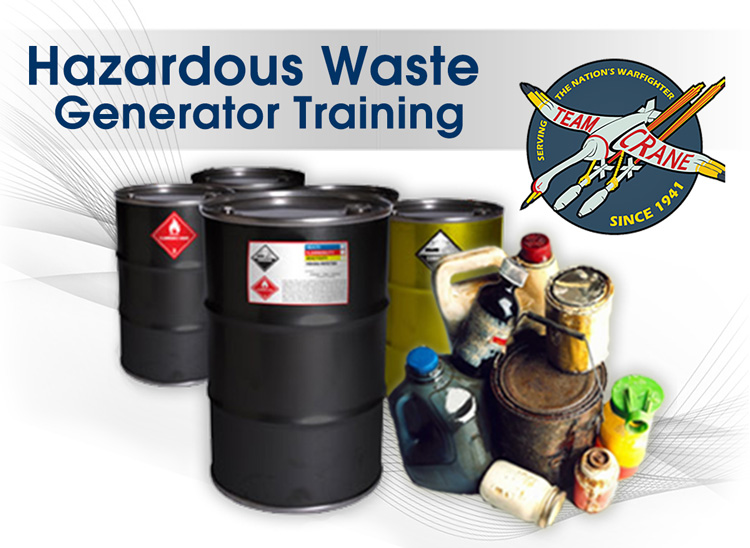 |
All personnel involved in the management of Hazardous Waste at an accumulation or storage site.
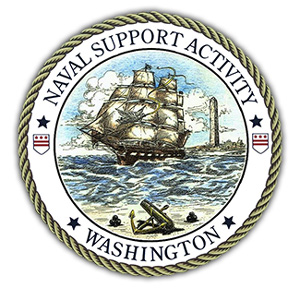 |
Training Updated May 2020
To comply with Executive Orders and U.S. Navy Instruction for Environmental Management Systems (EMS).
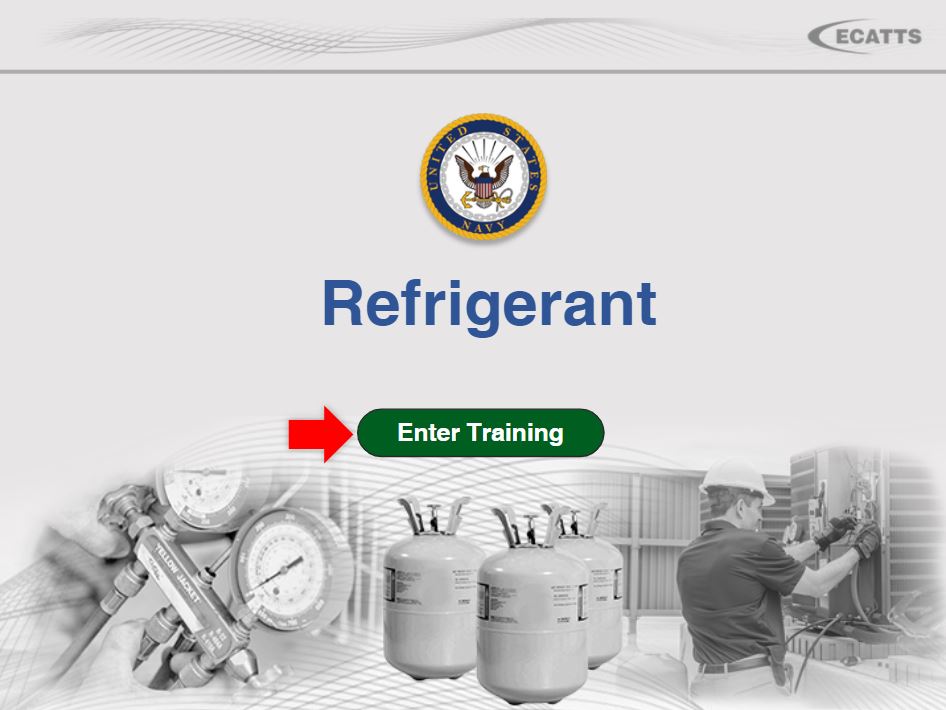 |
We've upgraded the Refrigerant training module to a new training format. The new format includes dynamic content presentations, more interactive elements, real-time feedback for knowledge checks, a notes feature, a table of contents, a resources area, and audio.
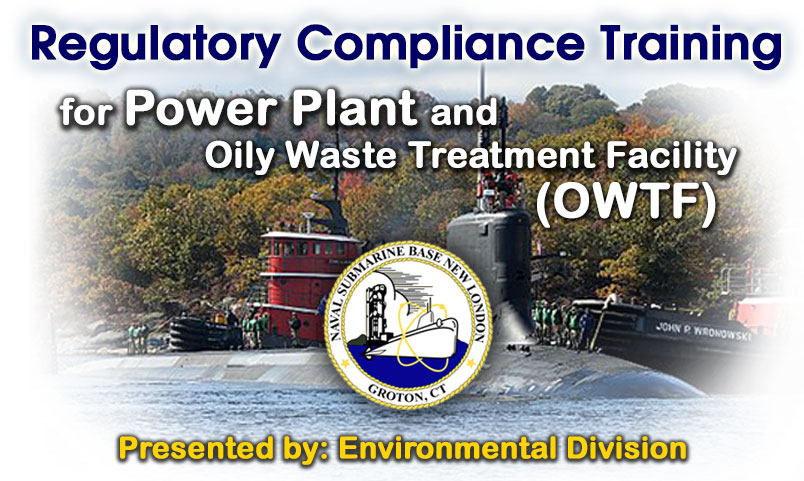 |
Naval Submarine Base New London Regulatory Overview, Regulatory Oversight, Notice of Violations,and Power Plant Most Regulated Entity on Base.
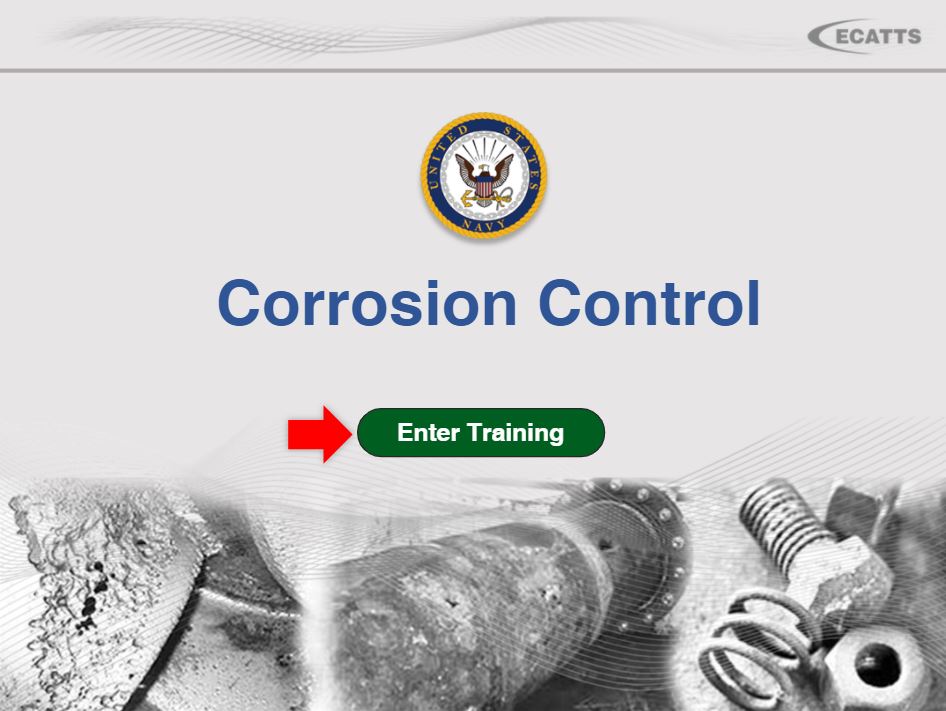 |
We've upgraded the Corrosion Control training module to a new training format. The new format includes dynamic content presentations, more interactive elements, real-time feedback for knowledge checks, a notes feature, a table of contents, a resources area, and audio.
We've upgraded the Recycling and the General Environmental Compliance Information training modules to a new training format. The new format includes dynamic content presentations, more interactive elements, real-time feedback for knowledge checks, a notes feature, a table of contents, a resources area, and audio.
The Training via Briefing feature in ECATTS has been updated in order to make it simpler for training managers to use. Keep in mind, this feature is designed to record training delivered in a briefing setting to people who do not have accounts in ECATTS and most likely will not have them in the future.
 |
Training Updated March 2025
Topics include state, local, and federal HW laws & regulations, penalties, identification, stream profiles, storage areas, containers, labeling, turn-in, recordkeeping, training & safety requirements, and contacts.
©2025 ECATT, Inc. - All rights reserved.
This material may not be published, broadcast, rewritten or redistributed without permission.

